
















Editor-In-Chief
Tara Melvin
Senior Editor
Andrew Eisenman
Photo Editor
Krysten Bauman
Ad Director
Susannah Sachdeva
Member Relations
Rosalyn Robinson
Marketing Director
Sarah Price
Promotions Assistant
Allory Williams
Editorial Assistant
Annie Beecham
Publisher Gina Beach
Associate Editor
Shane Barnes
Design Director
Alanna Geoghegan
Copy Chief
Rachel Godward
Web Designer
Pat Newman
Marketing Assistant
Will Cooper
Booking Assistant
Steve Zeisler
Design Assistants
Chelsea Blocker
Wendy Goldfarb
Contributors
Lindsay Bailey, Douglas Bair, Alec Bojalad, Shamus Eaton, Brenda Evans, Emma Frankart, Rebekah Meiser, Alex Menrisky, Collin Minnis, Brett Nuckles, Justin Noga, Eudora Peterson, Elizabeth Sheffield, Aadam Soorma, Stephanie Stark, Adam Wagner
Designers
Kelly Berry, Shaun Foran, Adrienne Hapanowicz, Sarah Harris, Kristin Hulse, Stephanie Linson, Seth Miller, Lizzie Rosegrant, Marissa Schoonover, Kelley Shaffer, Britton Spark, Tracy Stanfield, Francesca Wagner
Photographers
Andrew Burkle, Courtney Gross, Andrea Kozakewich, Dan Krauss, Conor Lamb, Pete Larson, Pat McCue, Kaitlin Orr, Denise Pansing, Kate Ramsey
Copy Staff
Meredith Barnett, Greg Gallant, Tasha Webber
Adviser Jack Brady

Having lived on the West Coast most of my life, I was unsure what to expect out of my four years in southeastern Ohio. I have come to realize that Athens is a culturally and creatively diverse community, a network created by a variety of personalities and backgrounds. This was Backdrop’s inspiration for the cover design.
The “Social Issue” is centered around the concept of community and covers a small portion of the many accomplishments, interests and concerns that contribute to the cultural climate of our brick-laden landscape.
As the financial crisis continues to be a topical presence in our lives, Backdrop covers the economy’s impact on students and community members. Freeganism is a way of life that consciously avoids consumerism, opting instead to acquire food through non-monetary means. Some individuals in Athens have also adopted this lifestyle as a statement of their beliefs. Additionally, we examine the unfortunate reality of HIV-positive individuals in Athens County and their reliance both on Social Security and out-of-the-way help centers that require long, gas-guzzling drives.
We also focus on the outstanding and sometimes unorthodox endeavors of the OU student body. From the nationally known Forensics team to the soaring Bobcats of the flight team, to the talented members of the Black Greek community, each organization brings a distinctive spirit to the Athens experience.
I have heard stories of rifts between “town and gown,” but my personal experiences with those outside the academic community have been fruitful and I truly believe in working toward community cohesiveness. Though we may initially be bound together only by geography, I hope this issue reflects Backdrop’s appreciation for the community and the individuals in it.
In Community,



Backdrop gets inside the minds of OU’s Forensics team, the nationally ranked empire fostered by coach Dan West.
Through community and group activities, OU’s black Greek life harbors a familial atmosphere.
On September 24, 2007, Jonathan Bebb murdered his father. This is his tragic story.
Court Street Stage
Music to warm your drunken heart
Bomb dot com
Xtranormal.com
Hot for Teacher
Matthew Friday & Ronaldo Vigo
South of the Border
Discovering Parkersburg, W. Va.
Exhibit A
Showcasing OU’s most creative minds
Racketeers
Local
The Inside Joke
Comedy in Athens
A Band Apart
Five Deadly Venoms
Fests for Less
Will work for music, beer
The Air Up There
Soaring with OU’s flight team
A True Pub Crawl
Wilson Burton tends bar, butts
Hot Wheels
Ridin’ with Athens’ hottest wheels
Swimmin’ Southeast Ohio
Where to get wet near Athens
In the Red
The Hunt for Porcelain Perfection
The scoop on where to poop
Reasonable Doubt
OU skeptics question everything
Love at First Bite
The secret ingredient is love
Coming Out in College
The pains of being true to oneself
Empire Strikes Back
OU Forensics team utilizes the force
Food for Naught
Urban foragers forego materialism
The Brotherhood
Black frats step into the spotlight
Madness
A story of patricide
Liquid Gold
Selling plasma for money Throwing Words
hard truth of emotional abuse
Bunny
and boobs
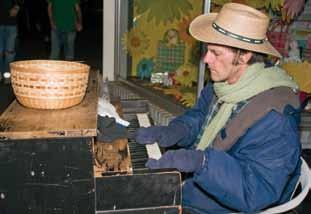
Playing in Athens for the past 10 years, you’ll find him in front of Cross Court wearing his signature hat (he buys them in Sahuayo, michoacan, mexico). The socks on Rick’s hands offer more dexterity than gloves. He formerly accompanied Elvis impersonators.
Instrument: A ”64-key piano” kept behind Court Street businesses, tamborine Specialties: Boogie Woogie
Most Requested: Piano man, The Entertainer “I really got started at around 15, after hearing meade Lux Lewis. After that it was mostly a matter of wearing out the rewind buttons on tape recorders.” www.littlejimmyparnell.com
Wannabe Spielbergs and Tarantinos alike can get their creative juices flowing and fast track their foray into the movie-making business with xtranormal. com. Though still in its beta version, this site lets users produce their very own short movie. According to the site, its mission is “to bring movie-making to the people.” It does this with a new approach to moviemaking that relies on one thing: the ability to type. The site allows users to choose different “worlds” for their characters to act in. From adventurous bank heists complete with drive-by shootings, to awkward attempts at acquiring a girl’s digits in the grocery store, the story is up to you.
Choose up to four actors and personalize their appearances. Need an obese woman with aviator shades and an afro? How
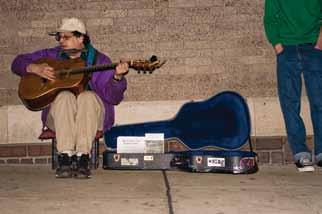
This avid Cavs fan and OU alum, originally from Columbus, has been playing in Athens on and off since a 1989 concert at the Union. He made $17 in his signature spot across from the Burrito Buggy trying to make back the $3 cover.
Instrument: Alvarez Yairi guitar, harmonica, voice Specialties: ‘60s, ‘70s and ‘80s rock
Most Requested: Cecilia, Last Dance with mary Jane “As long as I have this [guitar] I have a meal and I can make friends and get a place to stay the night,” Steve said. “I’m a Pisces. I was born on march 10, so I have that eternal optimism.” www.stevezarate.com
about a badass stealthninja equipped with throwing stars? Consider it done. Don’t forget to choose accents: Japanese, Australian, UK, and my personal favorite, Quebec French. Oui, the creators of xtranormal.com are committed to details.
So after choosing your world and selecting actors, it’s time to type up that Oscar-winning script. Try to avoid slang in your masterpieces because it leads to mispronunciation by the computer. The site is so detailed, it even lets users choose and preview the specific camera angles, animations of the actors (hands on hips, head scratch), their expressions (“Oh good heavens!” “Ew, gross.”), and ambient
noises (mortar explosions, belching and even a blues harmonica).
When you’re finished, post your movie to the site, where the world can view it and vote on it. There is also a forum where users share tips and tricks for making better movies and suggestions for improving the site.
Lights, camera, action!

BY JUSTIN NOGA

OR m ER SUPERNERD - TURNED - STUD BULL AND INTERDISCIPLINARY ART PROFESSOR mATTHEW F RIDAY LOVES TO TAL k ABOUT HISTORY AND THE m YSTERIOUSNESS OF “ HOTNESS .”
How would you define hotness, considering your own?
MF: I’m not sure I know what the term means, to be honest. I could honestly say that if I do have any hotness, I have not been aware of it. You said you can analyze symbolic information in images. Let’s say a painting were made of this interview, but we’re eating hotdogs. Would hotdogs make the scene inherently homoerotic?
MF: I’ll repeat what Freud said: Sometimes a cigar is just a cigar. You’d [need] more of a context to read it as having a sort of latent homoerotic symbolism. Like, if we’re very much enjoying our hot dogs and consuming them with a great deal of relish, and you take that painting and hang it next to a Robert Mapplethorpe photograph, well, there you’ve given it homoerotic context.
Since we’re under the assumption that everything in this interview will be sexualized, what do you think would kill that?
MF: See, I think I’m probably doing it here. I’m just historicizing everything you ask me, which is totally the most unarousing thing. That’s like the total cold shower. Or maybe not. I don’t know. Maybe people love history.

THENS NEWCO m ER R ONALDO V IGO, PROFESSOR OF m ATHE m ATICAL AND COGNITIVE PSYCHOLOGY, CREATED HIS OWN AWARD - WINNING m ATHE m ATICS THAT CAN PREDICT HU m AN CONCEPTUALIZATION BEHAVIOR .
Do you have epiphanies in your daily life regarding your hotness?
RV: Actually, no. I have epiphanies about my equations. I don’t think I’m “hot.” My equations are “hot.”
How old are you?
RV: How old am I? That’s the question? In that respect, I am like women. I have the right not to answer that.
Why did you accept participating in this?
RV: To be honest, I kind of want to advertise my lab, the SCOPE lab, because our research is really cutting edge and it’s going to be good for the university. This is going to put us up there with the MITs and Harvards. It’s somewhat of a puzzle to me that we have one of the best journalism schools in the nation and yet we don’t promote the quality of our academic prowess.
Have your equations gotten you laid at all?
RV: No. I used to be a judo sensei for over seven years in Los Angeles. I was a competitor. I won a few championships in judo. That, I think, did more for that than my equations.
BY A NNIE B EECHAM
parkersburg, W.Va., is not picturesque. Gloomy factories and drab storefronts loom from the banks of the Ohio River. Luckily, as the saying goes, beauty is skin deep, and what Parkersburg lacks in aesthetics it makes up for in other areas. Underneath the decay of the one-time wealthy area, which prospered during the post-Civil War oil and gas boom, is a town with enough character to (almost) rival Athens. Grab a friend or two and head east on the Appalachian Highway (better known as US50). In less than 45 minutes, you’ll bridge the Ohio River onto West Virginian soil, embarking on a uniquely Parkersburg experience.
Parkersburg’s crown jewel is The Blennerhassett Hotel. The elegant hotel includes a restaurant and bar, gift shop and coffee bar. The hotel’s restaurant, Spats, offers enticing entrées with a French flair. Note: you may want to bring Mom and Dad here so that they can foot the bill — delicious but très expensive. The patio and courtyard, which serves a lighter fare and offers a beer menu, is more suited for the cost-efficient tastes of the college student. With live music and outdoor grilling, it’s a regular Parkersburg paradise. As for the actual lodging — well, it ain’t cheap.

Traveling to West Virginia to get authentic Middle-Eastern cuisine sounds counterintuitive, but Cham’s Lebanese Cuisine is the real deal. Owner Rizkallah “Rick” Helou, a former Lebanese refugee, immigrated to the U.S. permanently in 1996, bought the restaurant space in 2006 and has been plating Fattoush, shish kabobs and other Lebanese delicacies ever since. Rick claims he serves the healthiest food in the country: grilled meats and vegetables, fresh herbs and heart-healthy olive oil abound. Drop by on a Friday night to be regaled by bona fide belly dancers. Do try a glass of Lebanese wine as well.
Housed in a modified library, Trans Allegheny Books claims to be the largest used book store in all of West Virginia. A wrought iron spiral staircase takes visitors through four stories of fiction, non-fiction, biographies and more. Their literary collection is impressive, and so, too, is the gathering of domestic cats lounging on chairs, steps and counters throughout the store.
Smoot Theatre’s history itself reads like a melodrama: the theater thrived after opening in 1926, but was abandoned in the ’80s, and scheduled for demolition in 1989. A group of heated protestors refused to let the landmark fall and raised enough greenbacks for the building to keep its doors open, marquee lit and seats filled. The theatre now regularly hosts live music, performing acts and seminars, and is in the process of being restored to its former splendor. Now, that’s a happy ending. Hop down a few blocks from the theatre to find the Oil and Gas Museum, home to the history of Parkersburg. Finally, the Parkersburg area offers a temporary fix for shopaholics: Vienna’s Grand Central Mall. We all know that Athens is not a shopping hub and the Market on State Street (the largely empty behemoth formerly known as the University Mall) isn’t deserving of the descriptor “mall.” Luckily you can satiate your retail cravings just a few miles from downtown Parkersburg. The mid-sized Grand Central Mall is ripe with the stores of any adequate shopping center: American Eagle, Old Navy and Footlocker, to name a few.
Calling Parkersburg “quaint” is like calling the Hocking River “sanitary,” but don’t let that keep you away. A day away from the vices of springtime in Athens could be a refreshing detox, so fill up your tank with the stuff that once fueled Parkersburg’s economy and take a walk on the West Virginia side.
Two-thirds of the world’s eggplant is grown in New Jersey.



Party of One
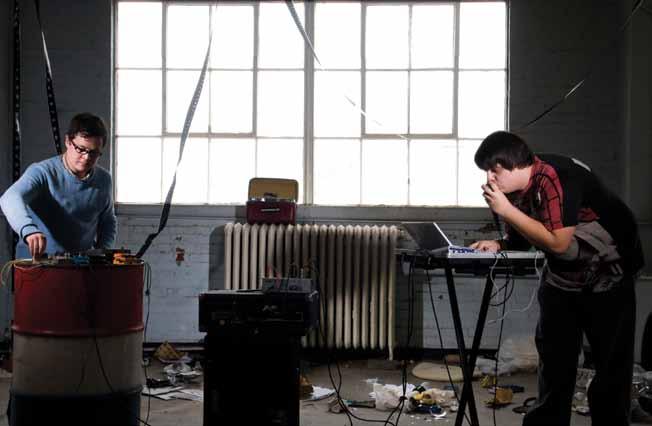
BY REBEkAH MEISER
In the world of noise music, full appreciation truly comes from watching it live. On a surprisingly warm Saturday night, I trekked to The Crystal Castle, a grungy but welcoming house venue on Central Avenue. I was an hour late, but none of the artists had started. I took a spot on a couch and began talking to the other early comers — one being Megan Burke, head of sales for ACRN, whose task for the night was to collect the $3 donation for the show. After about an hour of talking with Megan, I heard the familiar Mario theme song coming from the next room. Noticing my clear confusion, Megan smiled and said, “Come, look. This is how a show starts.”
The room was dark and lightly furnished: one chair, a beanbag and a table, on which an old school Nintendo, Game Boy and a small television sat. The few people crowded around the table were not gamers trying to save the princess from Bowser’s castle, but noise artists, namely
Jason Wright of Run_Coward_Run, who uses Nintendo and Game Boy for his interactive noise show.
Using video game consoles as instruments is not standard for noise artists. Actually, for them, “standard” isn’t standard. “The thing I like about noise is that there are not really any rules. It’s all pretty open,” said Ty Owen, a member of several noise bands in Athens, including Donner Party Dinner Party.
Noise music consists of harsh sounds and ambience (drone) that are manipulated through pedals, computers and synthesizers. The product is a raw, harsh sound that creates an unsettling atmosphere, which is exactly what some musicians aim to do. Aaron Vilk, an Ohio University sophomore who creates noise music, said, “That’s always been a big inspiration for me, to try to create the most claustrophobic, unsettling atmosphere I can with my music.”
The night’s performance did just that.
While the first artist brought flashbacks of playing video games after school, the second took the audience into the darkest corners of its minds. Donner Party Dinner Party, consisting of the aforementioned Ty Owen and junior Brian Jackson, performed next. Ty and Brian combined clips from Jurassic Park with sound effects such as static, heavy droning and high-pitched scraping. As they played, goose bumps spread across my arms. The spine-chilling feeling was overwhelming and I understood the disconcerting environment that Aaron described.
A lot of people have trouble finding meaning from what seems to be pointless, loud sounds and electronic loops. For those who create noise music though, the need to find meaning doesn’t make sense.
“It’s just kind of confusing because I don’t think there is really a whole lot to get. I mean, we just make music. I think most people make noise music just because it’s what makes sense to them,” Ty said.
Although musicians would argue that no two noise bands can sound alike, they agree that the process of making noise music largely depends on spontaneity. While performing, artists break chairs, bottles, and guitars and even drag microphones across glass to add texture to the song. Many artists also make performances an interactive experience by jumping into the audience or pulling audience members into the show, which is how Brian joined Donner Party Dinner Party. While this creates crazy performances and truly distinctive music, it prevents songs from being re-performed. As a result, every performance and “rehearsal” is recorded. Songs can be played again, but not in the same way that a rock or pop band would replay them.
“Theoretically I’m playing the same song at the same length with the same synth[esizer] patterns over and over but with all that goes through my pedals, I adjust the tones on it so it sounds different,” Aaron said.
Like most artists, noise musicians say they find inspiration everywhere but often times shun the use of common instruments. Instead, they utilize everyday, real-world sounds and items to create their music. Ty recently recorded an eight-minute bus ride
with a mini-cassette and is incorporating that into one of his songs. Ty and Brian also add sound and video to their music. Sound clips from the supposed leprechaun citing in Alabama were put into a couple of their songs.
Bob Hatt, another local noise artist, is
“That’s
always been a big inspiration for me, [trying] to create the most claustrophobic, unsettling atmosphere I can with my music.”
Aaron vilk, Noise Musician
a slight exception to the scene. While he also incorporates items such as sheet metal and glass into his music, he always uses his saxophone. When playing, he uses effects pedals to alter the sound, allowing him to play by himself and still keep performances interesting. Aaron generally uses synthesizers on Garage Band, focusing on distortion and effects channels.
Both special effects and self-constructed instruments make it nearly impossible to copy another artist’s sound. “Anyone could buy a strap and those certain effects
Metal Master
Morphs and distorts sounds in almost every way possible
ds-1 distortion
A pedal that distorts guitar and keyboard sounds, allowing all of the slight differences in sound to be heard
Sp 202-dr. Sample
Lets artists do loops, change the pitch, delay, modulate and has a built-in microphone
pedals and have a Jimmy Paige sound,” Aaron said. “But with noise you can’t [say] ‘oh, yeah, I’m going to buy [musician] Nate Young’s mini-disc player’ … a lot of it is custom built and custom designed.”
Although this genre is picking up in Athens and other parts of Ohio, musicians don’t expect to see it become popular anytime soon, if ever. “There’s no benefit to playing noise music, especially if you’re like ‘I want to be in a rock band and play music and go to L.A. and make [a lot] of money,’” Ty said. Aaron, Ty and Brian all said that they would love it if they could make a living doing noise, but don’t see that ever happening. The assertion that there is no money in creating this genre of music keeps it “pure,” according to Ty.
Whether listening to noise makes you squirm with discomfort or dance enthusiastically, it is undeniable that seeing it live is essential. As the other artists performed that night, the room shook and the energy was inescapable. After the show, people piled out onto the lawn. Spirits were as high as Amy Winehouse’s beehive (and, for that matter, Amy Winehouse herself) and I walked back into the dark with a new appreciation for noise. b
Sometimes small objects have great power. Each piece of equipment shown can dramatically alter the sound being produced, whether it be changing octaves or distorting keyboard sounds.

MXr Blue Box Takes a guitar signal or other sounds and lowers it two octaves
digital delay Box Records sounds and saves them so that they can be multiplied, manipulated and played back later
Zoom MrT-38 Micro rhythm
Trak drum Machine Makes drum rhythms and allows artists to pre-record beats and patterns
BY COLLIN MINNIS PHOTO GRAPH BY PETE LARSON
At Ohio University, the phrase “Laughter
After Dark” is likely associated with a crowd of drunken fraternity brothers belting out the lyrics to *NSYNC’s “I Want You Back,” or to a raccoon-ish bar queen sprawled out in the middle of Court Street. Of course, this is wrong, and these weekend flashbacks incite amusement rather than true laughter.
“Partying and going to the bars is such a big part of OU that it’s kind of hard to even talk about alternatives,” said Reuben Bresler, a senior creative writing major and founding president of The OU Stand Up Comedy Club. “We are not trying to say ‘Hey, stay out of the bars, come see comedy,’ but if you are not in the bars why not come see comedy?”
Laughter After Dark is a comedy show put on by comedic organizations on campus in the Baker Center Front Room every Friday at midnight. The professional comedian aspect of the show was cancelled this year due to budget constraints, but the all-student resurrection of the program has kept crowds laughing since late winter quarter. Despite various groups practicing different brands of comedy — Black Sheep Inc.’s improvisational humor, Comedy For The masses’ comedic skits and the OU Stand-Up Comedy Club’s individual acts — the comedy scene at OU is still virtually unknown. “I think that it is a pretty well-kept secret that we have a lot of really good stand up comedians and a lot of good comedians in general,” Reuben said.
Senior mike Reynolds, a playwriting major, is the senior adviser of Comedy For The masses
as well as the director of Black Sheep Inc., which performs $1 shows Thursday nights at 9 p.m. in Scripps 111. “There is a potential for comedy to do anything,” mike said. “I go to shows, and I’ll just enjoy it, and I’ll laugh and it will be a good escape.”
At a Laughter After Dark show hosted by Comedy for the masses, players performed on stage with the zeal of court jesters trying to keep their heads. “People are more afraid to speak in public than they are of dying,” said Reuben, of the nerves comedians must overcome.
Skits about death, sex, popular culture and political satire left the crowd ruminating in their seats. A good show is one where attendees “leave thinking about things and ways you can affect the environment you live in,” mike said.
There are formulas to being funny, and much like, well … sort of like math and physics, there are classes to dissect and apply humor.
“I think that most people regard education as a very serious enterprise and so it becomes deadening,” said Joan Connor, professor of creative writing at OU who has taught comedy through fiction.
Comedians have the virtue of humor. They bend the line between comedy and tragedy so that life’s metallic barrel shoots water rather than bullets. If laughter is the best medicine, joke dealers on campus are selling weekly prescriptions for a few dollars a pop.
b

Laughter After dark
Hosted by Comedy for the Masses Baker Front Room
Fridays at midnight
Comedy for the Masses
Skits about anything from politics to sex
Wednesdays 9 p.m.
Sundays 6:30 p.m.
Black Sheep Inc.
Improvisational humor
Thursdays 9 p.m.
Scripps 111
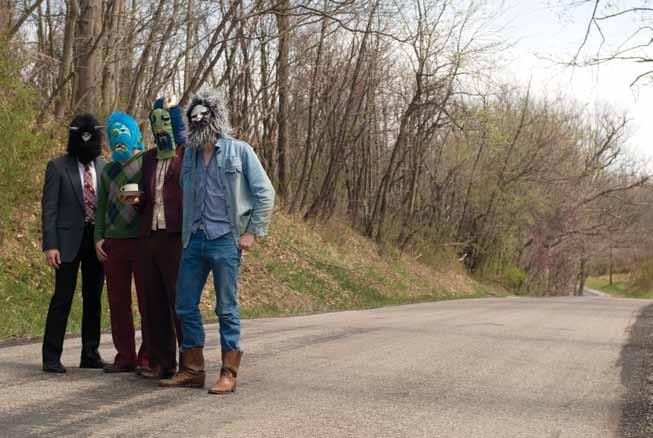
The hills of Athens ain’t no Court Street. Windy roads and acres of thick woods choke out any and all evidence of civilization. It’s like Deliverance, but with fewer banjos — and plenty of progressive rock. This sound, unordinary to the Athens scene, is thanks to the cabaret-meets-jazzmeets-classical style of the Dayton-born band Five Deadly Venoms.
The band of four friendly OU students — brothers Ben and Sam Ashman, longtime member Matt Emmons and relative newcomer Jamie Rymers — is surprisingly fussy at times (arguing over the merits of Chipotle, cat monikers). But when they play together, all of that contention becomes static noise.
Practicing in Matt and Ben’s farmhouse rental, the band packs into a cubby stuffed with instruments and swimming with wires that threaten each man’s movement. After a brief discussion about the set-list, the band begins to play. The house, and its plentiful acres, is covered in a dense, varied blanket of sound.
Matt’s synthesizers — he always uses synthesizers on “Horror Resistance Death”— chime in, setting the pace until
BY SHANE BARNES
Sam’s sax enters with a few staccato spurts, and then it all comes together in a fine package wrapped in Yes, Bach and, arguably, the first two songs of Traffic’s 1970 album John Barleycorn Must Die Ben pounds away a progressive roll on the drums, normally Matt’s domain, providing
The group is not only one of the most stylistically diverse bands in Athens, but also one of the most talented.
the all-important backbone of the piece, and Jamie plucks away at his bass, head bobbing up and down like some sort of Muppet. Finally the song crescendos and the band comes to a halt.
It’s readily evident that the group, which began with Matt and Ben — who have been playing together for more than 10 years — is not only one of the most stylistically diverse bands in Athens, but also one of the most talented. This comes as no surprise when their musical history is taken into consideration: each of the members is
proficient in at least three instruments, amounting to more than 10 total (cello, sax, clarinet, drums of all types, bass, guitar, organ, piano, etc., plus a few overlaps). Further, they have between them more than 25 years of experience. It is because of this heavily instrumental background that the group is predominantly musically driven, opposed to vocally — and that’s what sets them apart.
Athens’ music scene consists primarily of traditionally mainstream-sounding acts such as the once-folk Russenorsk, punk We March! or metal Skeletonwitch. Five Deadly Venoms, like so many bands in general, defies concrete classification. The Wakeman-esque keyboards and, when utilized, Ben’s calm, measured vocals work with the other elements to set the band apart. Whether it’s classic, jazz, or rock makes no difference. Though each member seems to be set on sounding like one thing or the other, Sam sums it up perfectly. “It’s something everyone can dance to, but also think about.”

B Y B RENDA EvANS
Every year, thousands of students make the musical pilgrimage to reach the oasis that is the summer festival. Those few precious days, when inhibitions take the back seat and music is everything, are the highlights of many a music lover’s year.
However, broke college students can’t just throw down hundreds of dollars for three days of revelry. When ticket prices alone reach $300, aspiring festival-goers can lose all hope. The general admission tickets for Bonnaroo cost $250, All Points West $199, Lollapalooza $190, Rothbury $250. Most of these prices will continue to rise. All will add on at least another $25 for fees, and some don’t include camping or hotel and parking expenses. Not to mention the costs of food, beer and water. Even showers have a price at some fests.
Through this discouraging profusion of dollar signs is a light at the end of the musically starved tunnel. There is, in fact, a way to avoid handing out the Benjamins and still experience those can’tmiss shows. Work exchange programs are the silver lining of a poor man’s summer — a solution for those willing to scrape gum with the sanitation crew for a chance to crowd surf to their favorite crooners. There are a few programs out there that actually trade free festival passes for odd jobs around the grounds.
Clean Vibes, a 10-year-old company, looks for both paid employees and volunteers to work at summer fests such as Lollapalooza, Bonnaroo, Treasure Island, All Good Music Festival, Mountain Jam and many more. Volunteers can work during the festival or a few days following in exchange for free admission. Volunteers are required to make a deposit of the ticket price as collateral. If they skip out on their shifts, the company will give the money to the fest. But if shift commitments are honored, the deposit is paid back in full.
some of the headliner shows. These perks must have made Annie forget that by the end of the night she was covered head to toe with “trash water, dirt, probably some vomit and God knows what else.”
If smelling like stale beer and looking like Pig Pen isn’t for you, try the Atlanta-based company, Shimon Presents: Work Exchange Team. They assist in 11 different jobs at festivals such as All Good, Coachella, Wakarusa, Rothbury, Camp Bisco and Gathering of the Vibes, only one of which includes trash duty. Jobs range from front gate ticketing to catering to artist check-in. Yes, you read that correctly: artist check-in. This job entails checking the artists playing at the fest either into the backstage area or into the artist camping area.

Paid positions are a completely different story. Travel expenses, hotel/camping (including showers) and meals are covered by Clean Vibes, and no deposit is required. Workers put in 10 hours a day at $10 an hour. Oh, and of course the admission is free. But don’t get too excited yet, Sparky. Paid positions work a few days before and during the fest, and stay until every last cigarette butt is picked off the ground.
Junior Annie Semenczuk worked as a paid staffer for Clean Vibes at Lollapalooza 2008. “It definitely wasn’t easy but it wasn’t that bad because we were surrounded by good music,” Annie said. She plans on working for Clean Vibes again this summer. Apparently, the power of music can make even the least glamorous jobs worthwhile; or maybe it’s the perks, like backstage access during
Most workers like Caroline Hosey — former volunteer and current intern for Shimon Presents: WET program — work regular positions like catering, parking, trash pickup and the street team. “The best part is meeting people from all over the country who work with you,” she said. “My favorite experiences have been where I’ve gotten to meet important people that ran the festival, or even the musicians. It made me see the festival from a different angle, and it was such a cool experience to be a part of it.” WET takes the time to ask every volunteer to list around three shows they absolutely do not want to miss and the team does its best to schedule volunteers accordingly. The average workday lasts four to five hours and the rest of the time is left for volunteers to revel in their relatively free admission. Volunteers are asked to make a deposit as well as a $10 application fee to cover the WET T-shirts and keep the program going. After the fest is over, the deposit is returned to the volunteer in full. Another perk of working with WET is free camping at premium camping sites, if volunteers arrive early enough.
If the thought of missing your favorite summer fests on the account of your funds is unbearable, you now have options. If you’re willing to roll up your sleeves in the name of music, the work exchange programs are a safe way to gain access to the best fests. While these programs may not compare to the freedom of going to a fest to enjoy every last act, it’s worth looking into for an alternative that will feed your festival need for the right price. Free, sort of.







B Y DOUGLAS
The deafening silence in the cockpit of Neil Hoy’s singleengine airplane is interrupted as the engine starts and the pilot nervously shouts the steps he’s about to take. Neil stares at the plane’s control panel. His shaking hand pulls back on the yoke, as he steers the plane down the runway — a sedan with wings. The nose turns up, the front wheel lifts off the ground and Neil is flying. Right now, he must prove himself a confident pilot, alone and at 5,000 feet. The plane’s speakers cackle: “Pull the power,” the voice says. “Get your airspeed down. Make your turn right. Adjust for the winds.”
The freshman Aviation Flight and Aviation Management major was raised around airplanes and on runways. His earliest memories in the cockpit date back to before he could even see over those daunting controls, before he could see the sky and the clouds below him. Now a member of the Flying Bobcats flight team, Neil has emerged a promising pilot.
Ohio University’s Flying Bobcats takes aviation majors under its wing and molds them into skilled pilots through hands-on experience in the cockpit. Between 20 and 30 members are on the team this year, doubled from years prior. They represent the Russ College of Engineering and Technology at aeronautical competitions throughout the country.
With family friends like the Wright Brothers’ descendants, Neil had an aviation-enriched childhood that included visits in which he would spend hours admiring Wright memorabilia. He was privileged to take behind-the-scenes tours of the WrightPatterson Air Force Base led by his grandfather, Walt, a former Air Force officer and current tour guide at the base. Neil’s grandfather earned a degree in aviation from Parks College — coincidentally, the same airport where Neil will compete at Nationals — and went on to fly helicopters in Vietnam. Neil’s father also flies, and Neil himself learned to fly on the family plane.
At 10 years old, Neil wasn’t entertained by paper airplanes like his friends. Rather, he was enticed by his family’s Mooney singleengine plane. His father, Doug, recognized a familiar gleam in Neil’s eyes when he saw the family plane. To strengthen their father-son bond, his father suggested a flight to the Urbana airport for the airport restaurant’s famous fruit pies.
“I live at the airport. On average, I’m there four to five hours a day. On Sundays, I have to be there at 10 a.m. and don’t get back [home] until 5 p.m.”
Neil Hoy
Member of Flying Bobcats flight team
This year the team has qualified for the national competition: Safety and Flight Evaluation Conference, which will take place at Parks College in Saint Louis, Ill., May 16-24. Events range from ground-related preflight inspection, to flying. Neil will compete in the ground event E6B multiple-choice test. The E6B is the manual calculator that figures weights, balance, performance, distance, times, speeds and winds to determine the appropriate direction for pilots to maintain course.
The pair drove to the hanger in the rural outskirts of Dayton that houses their plane, and Doug pulled the plane out onto the small strip of runway. As the engine rumbled, he opened the door to the cockpit and told his son to situate himself behind the controls. Eagerly, Neil slid across the plane and tightened his grip on the controls. His father followed his son into the cockpit and sat behind the other control panel. Neil’s grip on the controls transferred the vibrations of the engine throughout his veins, increasing his adrenaline rush.
It wasn’t until Neil flew his first solo flight years later that he realized his dad only let him think he was flying when really he was in the co-pilot seat. Yet Neil’s realization didn’t deteriorate his love for aviation.
“I like the environment of the cockpit. It’s just you and your co-
pilot. Although, there are more things to worry about when you are flying,” Neil said, “You can definitely fall asleep driving a car, but you can’t in a plane. There are so many things happening, it’s hard not to pay attention.”
While providing a source of family bonding for the Hoys, aviation also serves as an outlet for competition through logging flight hours. As a status rank, pilots meticulously log their hours spent at high altitudes; this rank fuels the smack-talk pilots boast to one another during those painfully long layovers.
“I really just want to pass up my dad. My dad has about 400 to 500 hours, and I just broke 100 hours a couple weeks ago. My grandpa stopped logging [at] 20,000 hours,” Neil said.
The competitive nature that his father and grandfather have instilled in him has allowed Neil to succeed as one of the youngest members on the Flying Bobcats national team.
“I live at the airport. On average, I’m there four to five hours a day. On Sundays, I have to be there at 10 a.m. and don’t get back [home] until 5 p.m.,” Neil said.
There is no typical day for Neil or any aviation major due to unpredictable weather conditions. Days range from overcast, unfavorable conditions that are spent cleaning planes, to sunny, calm afternoons spent soaring above the hills of southeastern Ohio. As the date for nationals approaches, the team spends its days avidly practicing both flight and ground skills at the Gordon K. Bush Ohio University Airport and Academic Center.
Rather than loading one of the athletic department’s Bobcat charter busses, the Flying Bobcats travel in style: four planes flown by the team members themselves.
As Neil prepares for his flight competition debut, he looks ahead to his career with the knowledge he has already accumulated from



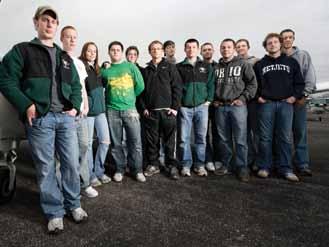
the Flying Bobcats. Neil hopes to someday become an airline pilot, and he is optimistic about the future prediction of a new hiring trend to replace older pilots as they retire. He has even tossed around the idea of corporate flying for a celebrity or a wealthy businessperson.
No matter where Neil lands in his career, the Flying Bobcats has honed this young pilot’s aviation skills.”[Flight team] gives you a vast knowledge about aviation,” he said. “It makes you a better pilot.” b

Pub bartender Wilson Burton gets down on his hands and knees for his job
Wilson Burton is a good student with a strong sense of responsibility. A mechanical engineering major, Wilson owns his own business — WBB Sealing — through which he repairs driveways for good money. He’s a candidate for engineering jobs around the nation, including at the FBI.
He is also the Pub’s most infamous bartender.
The story of how Wilson was hired is just as legendary as Wilson himself. One day he visited the Pub and got to talking about fishing with Chris Kraus, the Pub’s boss at the time. They decided to fish together the next week.
As they were fishing, Wilson and his friend, Brady, heard a huge splash. Chris’s seat had collapsed, causing him to fall and drop his new $300 pole. Brady jumped into the freezing, 12-foot deep water to find the pole. Wilson kept casting his line to catch the pole, but it kept falling off before he could reel it in. Kraus told them to stop trying but Wilson miraculously hooked it by the reel and brought it up.
“Chris was shocked,” Wilson said. “I handed him his pole and he said, ‘You’re hired.’”
That night Wilson drank on Kraus’


“I learned here that girls are gross.”
Wilson Burton Pub Bartender
tab. “I didn’t take advantage of it but I should have now that I think of it,” Wilson said. However, he proceeded to down several shots and six “aquariums,” the Pub’s infamous, half-gallon beer chalices. “I don’t even remember making it home,” Wilson said.
In his ensuing two and a half years as a Pub employee, Wilson has heard, seen and dealt with it all: every stupid pick-up line imaginable, the drunken smashing of aquarium chalices, even a mom straddling the urinal in the men’s bathroom.
One particularly gross misadventure of Wilson’s involved a clogged toilet, a busy
d rink up!
Whatever: Yukon Jack, Jim Beam and Wild Turkey. Now you know never to say, “I’ll have a shot of whatever” at the Pub. Just have a drink in mind, and all will be well.
Trout Bait: Wilson’s pride and joy is made of cherry vodka, grape vodka, peach vodka, regular vodka, apple Pucker, watermelon vodka, apple vodka, cranberry, sour, Seven and a little bit of orange juice.
night, and no plunger in sight. “I had to get down on my hands and knees and reach in there with a garbage bag over my hand,” Wilson said. “Girls were still in there trying to go to the bathroom. I was gagging. I think I actually puked.”
Wilson hesitantly continued. “I learned here that girls are gross,” he said, starting but (thankfully) not finishing a story involving the girl’s bathroom and a creative display of tampons. Put simply, “Weird stuff happens at the Pub.”
The bar also has an arsenal of drinks as eccentric as its customers. “The number one shot here is ‘buca’ — sambuca,” Wilson said. The employees take a shot of the Italian liquor at 9 every night. “On big weekends, like Mom’s Weekend or Homecoming, we can go through around six bottles a night,” Wilson said. “On a normal school day, some people just come in to take a shot of ’buca and leave.”
While ’buca shots and aquariums have become well-known, most bar-goers are not familiar with “Trout Bait,” Wilson’s magnum opus.
“One night I spent my whole shift trying to make a shot that tastes like trout bait. Actual trout bait is made up of these little tiny pebbles, kind of like Play Dough,” Wilson said. “The drink isn’t salty like Play Dough, though. It’s sweet. I make it when I’m looking for a good time.”


“I’ve left notes on all the Vespas I could find in and around Athens, and I figure we could take scenic trips out to Strouds Run and hang out.”
OWNEr: kramer Ditty, 25, video production major MOdEL: 1969 vespa Sprint 150 fuN fACT: This bad boy was imported from Saigon, vietnam

“The car had an accident with a deer, and we decided to have it fixed. my uncle asked me what color he should paint it, and I said pink. I thought it was going to be a pearly pink.”
OWNEr: Patricia Dorsey, 22, art history major MOdEL: 1995 Chrysler Lebaron fuN fACT: Her guy friends named it Lebron, a play on the car’s model

BY LINDSAY BAILEY
Spring has sprung in southeastern Ohio and the warm weather conjures up dreams of margaritas, tanning oil and long days at the beach. Unfortunately, Athens’ closest ocean-front property is about six hours away. But don’t despair. Grab some sunscreen, a few friends and check out these six lakeside beaches all within 40 minutes or less of Athens. It may not be the Bahamas, but a good day-trip should tide us over until summer finally arrives.
Strouds run State park 11661 State Park Road
Athens, OH 45701 (740) 592-2303
Just a quick 10-minute drive from Athens, Strouds Run is the closest place you’ll find a sandy beach unless you count the volleyball courts on South Green. The rustic setting is picturesque — even if the water isn’t. The bathrooms are literally holes dug in the ground. Canoes are available for rental and beach volleyball is a must.
Lake Snowden
5900 US Highway 50 Albany, OH 45651 (740) 698-6373
Hocking College’s wildlife preserve is peaceful and certainly not crowded. The water is relatively clear and the swimming area is large. The only problem is that the beach is small and awkwardly positioned on a hill. Less busy than Strouds Run, Lake Snowden is a quiet alternative if you’re not looking to drive more than a few miles.
Lake Logan
30043 Lake Logan Rd Logan, OH 43138 (740) 385-6842
One of the state’s best lakes for fishing is only 40 minutes from Athens. The 527foot public swimming beach provides visitors with picnic areas, concessions and drinking water. The lake also has bathrooms and changing booths. Paddleboats and canoes are available for rental, and motorized boats are also welcome on the lake.


Burr Oak State park
5250 Beach Road
Glouster, OH 45732 (740) 767-3570
This public swimming beach, about 40 minutes from Athens, has canoe rental and volleyball courts. A bathhouse sits next to the lake providing showers and changing rooms. Cottages (with air conditioning and cable TV) and campgrounds are available at a reasonable price if you want to make the trip an overnighter. The lodge also has rooms for rent, indoor swimming and a restaurant.
Lake Hope
27331 State Route 278
McArthur, OH 45651 (740) 596-4938
For a resort-like feel, check out Lake Hope. Thirty minutes away, this 600-foot beach provides not only a concession stand and changing rooms — whoa — but also a beach house complete with a sundeck. Canoe rental is available every day starting in mid-May.




B Y A LE x ME NRIS kY
The man wakes, pulling himself out of the rickety bed and into the bathroom. His hands brushes past a series of pillboxes — each for a specific day of the week — which conceal capsules to combat the HIV within him. But those are for later. Heading into the kitchen, he reaches for an envelope on the counter. The envelope is what he’s worried about now. The envelope carries proof that the next few weeks will be harder than the last few, which were harder than the few before that. The envelope reminds him that Social Security is decreasing and becoming harder and harder to get.
Fourteen hours pass. The envelope lies opened in a pile on a desk. Now it is time for the pill. The man unlatches the lid on today’s box. He takes the medicine that will boost his T-cell level, preserving him for a short time more. These white blood cells that fight infection are decreased by the presence of the human immunodeficiency virus. The man has a small window of time to take his pill — less than a half hour now — until the balance the pill creates is thrown off, and his T-cell level drops too low. But that is no longer his biggest fear; the contents of the envelope continue to burn away at his hope.
This man is not faceless. He is very real.
He has a wife, also infected with the disease, and a home. And there are many more like him. A fearful group exists in the Athens area, whose members have AIDS or carry HIV, and many are being pummeled by the economic crisis that is striking Appalachia harder than most areas.
The Athens County Department of Job and Family Services, an organization that helps needy families, has lost a drastic amount of resources following the onset of the recession. The Ohio Works First program, which the department utilizes to provide aid and help individuals find employment, has also become insufficient for supporting those in need.
On top of this, Social Security funds are decreasing at an alarming rate. In the 2008 fiscal year, $544 billion was set-aside specifically for Social Security, down from the $608 billion in 2006. It is speculated that Social Security spending will decrease further as an indirect result of the separation of Social Security and Medicare from the rest of the budget this fiscal year. Although

it is a national problem, low-income areas such as Appalachia are especially affected.
How exactly is this crisis affecting the HIV/AIDS community differently? The man with the envelope finds himself at the mercy of those around him. In Athens County, one of the primary reasons the HIV/AIDS community has it even harder is due to the stigma of the disease — an irrational fear that AIDS and HIV are communicable; that they can be passed through the air like a common cold.
In Athens County, population 63,275, 41.8 people per every 100,000 have been diagnosed with AIDS or HIV, compared to 9.6 in Columbus, population 733,203 and 29.2 in New York City, population over 8 million. This means that although only about 26 individuals in Athens County are infected, the HIV/AIDS density in the Athens area is still particularly high. And unfortunately, many who are infected are facing this problem alone.
“Economic problems affect a wide variety of people in what might be the same ways,”
said Mark Sutton, project manager in the Department of Geriatric Medicine at Ohio University. He rubs his hands back and forth as he considers the problems hitting the area, his mouth stretched taut. “It’s a real challenge in these rural areas that don’t have a whole lot of people who can specialize in [HIV treatment]. And with the stigma, many people can’t find a provider locally, or they feel like they’re being treated at a distance.”
In southeast Ohio, those who have HIV/AIDS can feel that they’re being held at arm’s length whenever they approach a local doctor, as intimidated as they are by the overwhelming sense that nobody wants to be near them. Sutton believes that the stigma in Appalachia is greater and that acceptance is higher in urban areas. And Athens, over an hour away from the nearest major city, must face the stigma head-on.
If you feel that all eyes look upon you with fear, or that you cannot trust your doctor to be impartial; if it seems that your neighbors and coworkers have abandoned you, where do you seek help?
“[Life] is less stressful when you’re out with more people with [HIV] status,” the HIV positive man said. But he admitted that it is difficult to get to these comfortable urban centers, especially when welfare, Social Security and other government programs have decreased so much that people are giving up medication they need because they can’t afford it. On top of this, about 50 million Americansarewithout health insurance— approximately onesixth of the entire population.
Having spoken all over the country about the struggles she and other HIV positive people face, Marvelyn Brown has seen the havoc the financial downfall has been wreaking upon the HIV/AIDS community.
“Before the economic crisis, there was a crisis.”
That envelope still sits there. Even if it is forgotten for the moment, even if the man moves on to run to the store, to cut the lawn, to take his meds, the envelope is still there. It waits to be opened and for the contents to be read. The man who hides his face knows it does not have to be hidden. He knows he will be welcome when he reaches the city, when he meets that doctor, when he finds that inclusive community. But that inclusive community does not yet exist for him in Appalachia, and because of the check in the envelope, that sad, simple fact can make all the difference in all the wrong directions. b
“Most of these communities are completely ignorant and act like [HIV] doesn’t exist,” said the wife of the man with the envelope. Her voice quivered; not with anger, but with sadness. “In fact, nobody talks about it. There’s no talk about [HIV] other than derogatorily or with fear.” The stigma makes it hard for the HIV/AIDS community to bear the burden of an economic crisis, and the problem only complicates when it branches into treatment.
One of the underlying problems of AIDS treatment in Appalachia is transportation. If you feel that all eyes look upon you with fear, or that you cannot trust your doctor to be impartial; if it seems that your neighbors and coworkers have abandoned you, where do you seek help? You have to travel somewhere you feel comfortable, maybe a big city. But if your resources and funds are limited, local facilities may be your only option.
True, the Athens Aids Task Force and local hospitals such as O’Bleness are available should a HIV/AIDS patient need immediate attention or support, but the AATF’s financial resources are desperately lacking and people with HIV or AIDS are sometimes unwilling to approach the hospital staff.
“It’s definitely going to be a problem to continue to try to get medicine and try to stay healthy because there’s so much more that comes along besides just the medicine and health care,” she said.
Brown, the 2007 Emmy Award winner for Outstanding Public Service Announcement, knows health problems are exacerbated in areas such as Athens County, and so do other HIV/AIDS infected residents of Appalachia.
“The problem is, when your immune system’s low, [you’re] spending more on cold medicine, and it’s compounded and creates more of a trickle effect,” the HIV infected man said. “Oh, and cleaning supplies,” his wife interjected, recalling the latest hardship she and her husband have been facing, “Keeping everything clean. That goes up too because you’re worried you’ll get sick again.”
Combine transportation troubles, overthe-counter medicine costs, health care programs and Social Security reductions, and the situation doesn’t look good. However, there are always ways to get help. The HIV/AIDS community in the area praises the Athens AIDS Task Force for trying its hardest to help those it has sworn to protect.
“The Task Force is fabulous, but they could really use the help,” the man with HIV said. But perhaps the problem goes deeper than the economic crisis. The message Brown has been advocating recently is
planned parenthood
920 N. Main St. Athens, Ohio 45701 (740) 593-6979
Athens AIdS Task force
18 N. College St. Athens, Ohio 45701 (740) 594-3814 (800) 667-2323
Zanesville-Muskingham Health department
205 Seventh St. Zanesville, Ohio 43701 (740) 454-9741
American red Cross/Washington County AIdS Task force
401 4th St. Marietta, Ohio 45750 (740) 374-9119
ross County AIdS Task force
P.O. Box 38
Chillicothe, Ohio 45601 (740) 773-4357

BY AADAM SOORMA AkA THE POOPMAN
Shuffling out of another mindnumbing lecture, you traverse College Green and hope no one notices the “I don’t have time to stop and chat” look on your face, coupled with the quick, shortened stride you’ve adopted. That morning cup of coffee has warmed up your gastrointestinal engine, and you begin to thank the glossy, enameled receptacle gods for that one-hour break before your next class. That’s when you feel it — the burning, churning sensation — and your vision temporarily blurs. Buildings shift in and out of focus as you pick up the pace. You’re James Bond, but this is no ordinary
covert operation. You catch yourself scanning buildings’ interiors from the outside as sweat drips from your brow. No clock or sundial was designed for this precise moment — it’s poop time.
The most shameless and natural of body functions, according to a popular children’s book, is something everyone is doing. And although we can’t always control when, as long as we’re pottytrained humans, and exercise a little self-control, we can always control where we do our business. So save this article, and heed the advice your poopman giveth: Here’s the scoop on where to poop.
I’m not a businessman
I’m a business ... man
COPELAND H ALL 6TH F LOOR
Having never taken a class in our “Court Street College of Business Tower” (and having previously enjoyed seconds at Boyd Dining Hall’s enchilada night), I felt a little uneasy walking into Copeland Hall. But one swift elevator ride later, I entered a clean, spacious, office-like abyss. Privately tucked away on the top floor, this men’s room features a rarity for the Y chromosome — an inviting, ceramic shelf. A perfect date for your blazer and briefcase. Cleanliness and common sense come together nicely in Copeland. Well-lit and well-stocked with amenities, this investment was a no-brainer. Buy, sell or hold? I’ll tell you which one I didn’t do...
The only chance the Browns have of making the Superbowl
Being a runner, I’m a firm believer in access to a clean, proximate facility with indoor plumbing. Knowing where the best leaves are on a wooded trail will only get you so far in life. Enter Ping — a welcoming W.C. and a wise stop before maxing out on squats. This restroom features ample space and virtually no lingering odor. Ping’s pungent-free poopatorium is perfect for that mid-workout pause. And with a full-length mirror, why not strike that quick flex you’ve been hoping that girl two treadmills down from you has been noticing? I’m no certified ref, but on fourth and short — are you punting or grunting?
When researching this article, I was assuming that the newer campus buildings would have the nicer bathrooms. Lindley Hall, however, made me see past my stereotype and made all those awkward walks through unfamiliar premises worth it. A real hidden gem, this third floor getaway puts others to shame with high water pressure faucets and liquid soap dispensers. Formerly a dorm, the relatively older building is now, among other things, home to the school of interdisciplinary arts. With a low-traffic zone and locking stall doors, you can finally be at peace while dropping the kids off at this glazed, glistening pool.
S CRIPPS H ALL B ASE m ENT L EVEL
If men’s rooms gave out frequent user points, I would be guilty as charged with MVP of the Scripps Hall basement. A place where some type of tangible reading material is always nearby, this restroom was undoubtedly where Matt Lauer decided to put number two in its place. A word of caution — Scripps bathrooms don’t normally feature door locks. Don’t be surprised if an unsuspecting poop donor stumbles in on your moment of vulnerability. Also, these bathrooms are unusually quiet. So if you sit down and realize you’re on the verge of a jailbreak, maybe ruffle that copy of The Post a little or let out a fake cough. Scripps sees a moderate to high level of traffic on a day-to-day basis.
Hover time
P ORTA -J OHN O UTSIDE THE O LD SAE H OUSE
Possibly the most unpleasant pooping experience we’ve all had to endure at some point, is the porta-john poop. Well, this temporary outhouse is no different. Who knows if it’s going to have TP? Dirty, cramped and lit at the mercy of the sun, when it comes to dumping, porta-johns normally assume the “last resort” role. But if you can talk that kid no one likes into wandering into this claustrophobic mess hole, you can run up and knock him into a spiraling trip down Jeff Hill.
Five, Six, Seven, Eight out of eight stars for OU’s finest facility
P UTNA m H ALL 1ST F LOOR
I cautiously enter Putnam Hall from the bottom of Jeff Hill, expecting to be the only male inside. Home to OU’s School of Dance, the door to the men’s room, conveniently located directly in front of the main entrance, is slightly ajar. Is this a sign? The wooden portal creaks as I make my way into the flushing meadows. The aesthetics immediately grab a hold of me. A sort of “bathroom feng-shui,” I notice the purple-tiled floors clash beautifully with the golden yellow walls. Large dividers separate the two urinals, and the back wall dons two full-length mirrors. At this point, I don’t even have to poop anymore. Is this magic?
“You can have nice facilities, but if they aren’t well-kept, it means nothing,” Madeleine Scott, director of the School of Dance, explained. “Our students take several [dance] classes barefoot, so it’s very important our floors and surfaces are clean.”
This first floor masterpiece, I’m told, also serves the public during dance performances.
“Cleanliness makes the buildings more presentable,” Angela Cain, a facilities management worker of seven years, said. “If the bathrooms are clean, the building is clean. The parents feel much more comfortable too about sending their kids here when they see clean, well-kept facilities.”
As OU’s best bathroom, Putnam Hall will not disappoint. And for the really adventurous powder room patrons, check out the showers on the third floor!
the Ohio University Skeptic Society takes a closer look at pseudoscience, paranormal claims and medical quackery
BY BRETT NUCkLES
Three young men huddle outside the cluttered windows of the Athens Book Center. They test their breath against the chill air as they sit in lawn chairs. It hangs in vaporous clouds then disappears. A young man bundled in a brown coat passes them as he approaches the entrance of the store.
“If you’re here to see the psychics,” one of the lawn chair tenants said, handing him a small square pamphlet, “give this a good look.”
On selected weekends throughout the year, a half dozen established psychics descend on the Athens Book Center to provide psychic readings for 30 to 50 interested patrons. For just a few bucks anyone can get a glimpse into the future. Sounds like a fair exchange, right?
Not if you ask the young pamphleteers outside. They’re members of the Ohio University Skeptic Society, a new student group that
seeks to promote science and rational thinking over pseudoscience and paranormal claims — ghosts, UFOs, superstitions and snakeoil (allegedly fradulent remedies) are just a few examples. And the pamphlets? Ten page fold-outs that detail, according to the skeptics, exactly how self-proclaimed psychics cheat, con and swindle believers out of their hard-earned cash.
“This is what you call skeptical activism,” one of the young men said. “We’re here to educate people.”
Another student contemplated the skeptical position: “Are psychics real? It’s hard to say with absolute certainty that something doesn’t exist. But there’s pretty good evidence that says they’re not.”
Appalachia is ghost country — a haven for the strange and paranormal. Ask the locals. This town, it turns out, is an ideal place for a group of dedicated skeptics.
“[Skepticism] is a methodology. It’s a way to look at the stories, claims and ideas, and find out what parts are probably true and

The skeptical method is embodied in the scientific method. It seeks to find and test naturalistic explanations for natural phenomena by critically evaluating the evidence.
“Everybody knows how to be a skeptic,” said Andres Ruiz, sophomore criminology major. “Think about how you go about buying a car.


Extrasensory perception
Belief in psychic power is pervasive. This pseudoscience comes in many forms— fortune telling, telekenesis and channeling are just a few.

Cryptozoology
Crypotozoologists specialize in searching for mythical beasts. Nessy, Bigfoot and the Chupacabra are among the most coveted enigmas.
You’re not just going to assume that the salesman is a nice guy who’s going to sell you a nice car — you’re going to check it out and take it for a test drive first. Being a skeptic means extending that sort of thinking to all of your beliefs.”
The movement has manifested itself in books, blogs and TV shows. The group maintains a blog on www.ouskeptics.com They’ve traveled to the Creation Museum in Kentucky and will attend the national skeptic conference in Las Vegas for the Amaz!ng Meeting 7 in July.
Skeptics thrive on pseudoscience. They love talking about the weird things that people believe. Psychics, mystics, UFO sightings, faith healers, conspiracy theorists, astrologists and ghost hunters are all fair game for investigation.
Skeptics demand compelling evidence to support their beliefs. Extraordinary claims, they say, require extraordinary evidence. Dr. Michael Shermer, founder of the acclaimed Skeptics Society in Los Angeles, has been one of the most vocal proponents of the movement. In his manifesto, Why People Believe Weird Things, he wrote: “Skeptics are from Missouri — the ‘Show-Me’ state.” In other words, when a skeptic encounters a fantastic claim, he says, “That’s nice. Prove it.”

Astrology
Astrologers say that the relative position of the planets and stars govern human affairs. Horoscopes might be the most popular manifestation.

Alternative Medicine
“Alternative” medicine has gained a tremendous foothold in the U.S. Some dubious examples are acupuncture, homeopathy and aromatherapy.
skeptic if you weren’t. But take the psychics and pull them out of their performance, then test them with a few reasonable controls in place. They fail every time.”
Andres has similar ideas. “Skeptics would be more excited than anyone if these claims were true,” he said.
For many, the skeptical movement is a revelation. Your beliefs concerning the paranormal don’t have to be shaped by hearsay, folklore and science fiction. Some very smart people are out there investigating (and quite frequently debunking) these claims.
But skeptics aren’t just debunkers. The movement, it turns out, has a serious side.
“We want to teach people how to watch out for medical fraud and snake oil. That kind of thing can be very dangerous,” said Andres.
“People don’t know what’s true and what’s not — and they don’t know how to know. It’s the responsibility of skeptics and the scientific community to help out.”
David Plumb, OUSS President

The OUSS takes this evidence-based approach very seriously. And, though there is typically a scheduled topic at each meeting, it is more of an open-forum for discussion.
At one meeting the conversation turned to Uri Geller, a famous psychic who claims to bend spoons with his mind. “There’s one huge problem that these psychics have to deal with,” David said. “There’s absolutely nothing to differentiate what they do with what magicians and performers can do just as well — sometimes even better.”
And he’s right. Professional magicians are able to replicate the acts of alleged psychics without claiming any psychic ability. They can convince willing participants that their minds have been read, and they do it with simple psychology and the power of suggestion.
“If we ever find out that psychic power is real, I’ll be floored,” said David. “I’m totally open to the possibility. You’d be a bad
David echoed the sentiment: “People don’t know what’s true and what’s not. It’s the responsibility of skeptics and the scientific community to help out.”
The message is clear: In medical situations, you should follow the science. Athens is home to dozens of New Age practitioners, each offering a unique, if controversial, brand of “alternative medicine” ranging from spiritual healing and acupuncture to vibration healing.
With so much at stake, this growing group of skeptics will continue to lead the way in the fight against pseudoscience. New members are always welcome at weekly meetings, even if they have no prior skeptical experience.
“Anyone looking for an interesting conversation should come check it out,” Andres said. “It’s always really fun.”
David is eager to point out to potential new members that OUSS isn’t just a group of stubborn curmudgeons. “People immediately think we’re close-minded defenders of the status quo,” he said, “But that isn’t true. Skeptics are always open to having their minds changed — with the right evidence.”
An intimate and inexpensive night in with your
BY EMMA FRAN k ART
Whether you’re looking to impress on a first date or trying to spice up an established relationship, food is always the answer. We’ve all heard the way to a man’s heart is through his stomach and with women — it’s wining and dining. But we’re in college. In Athens. In a recession. Money is tight, and Chipotle will never be romantic. Treating your honey to a homemade meal is easier than you might think. You’ll get bonus points for effort and will save money compared to dinner for two at a decent restaurant.
John Bender, professor of Philosophy of Sex and Love, is a self-described food aficionado, and has some tips for new cooks. He stresses that “work in the kitchen is like a dance,” and that a cook needs to be attentive to the steps. But what if you have two culinary left feet? Jeremy Reed, head chef at Stephen’s Restaurant, suggests making pasta and following directions on the box. Reed also suggests doing a practice

run to allow enough time to fix unexpected kinks. Burning the food (or yourself) is not romantic. Above all, he says that freshness is the key aspect of any meal. Ambiance is equally if not more important. An interrupting roommate or week-old dishes stacked in the sink are definite mood
“I screwed up! Now what?”
Okay, so your food resembles the smoking remnants of last weekend’s couch fire. Throw it out. It’s not salvageable, so don’t waste time trying. Do you have time to start over? Do you have the ingredients? If you do, then great; re-make the dish and this time, pay attention! If a redo isn’t an option, check your kitchen. Do you have any easy substitutes? If your cupboard is bare, you could always run to Applebee’s, get a fancy-looking dish for carryout, and pretend you made it yourself.
First, stay calm! If it’s more than just a minor sting, run cool (not cold) water over the area. If your clothing or a sauce of some sort is trapping heat over the burn, carefully remove the covering. NEVER put butter, oil, or thick creams or salves on a severe burn, as these will trap heat and exacerbate the situation. keep the burned area cool, and continue cooking if possible. If the burned area is numb, it’s probably a third-degree burn, in which case you should go to the hospital immediately. You can always laugh about the crazy escapade later.
killers. If you don’t have a table, spread a blanket on the floor and have a picnic. Clean the whole house, as your date probably won’t be confined to the plate. Find some quiet background music, like the Rat Pack, Michael Bublé, Mozart or Handel. Thanks to sites like pandora.com, you don’t even have to own the music. Just type in the name of an artist or song, and Pandora automatically finds other songs with similar musical qualities. It’s like having your own digital deejay.
So you’ve decided on a sexy tune, but what about the culinary steps? Fear not, oh rhythmless one; Backdrop is here to save the date. Just follow the steps listed and you’ll be facing the awkward “should we hang out in the living room or my bedroom?” question in no time. You’re on your own with that one.
date
This scenario is easily avoided if you ask questions about allergies beforehand. If you didn’t do this, see if you can serve any portion of the meal as a main course. If your date can’t eat anything that you’re serving, chalk it up to poor planning. Your best bet is to treat your sweetie to dinner out — his or her choice of venue. You could also offer a rain check, with avid promises for a more suitable meal next time.
Scallops:
½ c. olive oil
½ TBS. garlic powder
½ TBS. onion powder
1 tsp. cumin
1 tsp. red pepper flakes
½ tsp cinnamon
a dash of salt and pepper
½ lb. sea scallops
(Get them in the frozen section of your grocery store if you don’t want to splurge on fresh ones; they still taste good. If seafood isn’t an option, you could use bitesize pieces of an inexpensive steak, or even tofu if you want to go vegetarian).
Rice:
1 c. minute rice
1 c. chicken broth (use water if you’re making a vegetarian dish)
¼ tsp. cumin
¼ TBS. each garlic powder and onion powder
a good pinch of cinnamon
3 TBS. tomato sauce
1 red pepper
a dash of salt and pepper
1 8-oz bag of semi-sweet chocolate chips
½ tsp. cinnamon
¼ tsp. cumin
¼ tsp nutmeg
fresh fruits (strawberries, raspberries, and bananas work well), marshmallows and graham crackers (all for dipping)
Fill a medium-sized pot with water and bring to a boil. Grab a small ceramic bowl (one that will sit on top of the pot without falling in or touching the water) and set it on top. Put the chocolate chips, cinnamon, and cumin in the bowl and let melt, stirring occasionally. Under no circumstances should you put the chocolate chips into the microwave, or in a pot that is touching
A shrimp’s heart is in its head.
Combine the first 7 ingredients into a bowl and mix them together. Add the scallops, making sure they’re all covered. Put a lid or plastic wrap over the bowl and put it in the fridge. Let marinade for an hour.
After one hour, add the chicken broth to a pot and bring to a boil. Add the minute rice and set aside for a few minutes to soak up the broth. Pour a little olive oil into a small pan and turn it on medium-high heat. As it heats up, chop the red pepper into ½” to 1” chunks, discarding the spongy core and seeds. Add the pepper to the pan and season with a little bit of salt and pepper. Sear the pepper, and set aside.
Return the pan to the stove and add the scallops. Discard the marinade, because it touched raw food. Sear the scallops for 5 minutes on one side, flip them over, and sear for another 3 minutes. When they’re done, they should be opaque and juicy.
While the scallops are searing, stir the tomato sauce into the rice. Then add the cumin, garlic powder, onion powder, and cinnamon. Stir until mixed, then serve with the seared scallops immediately.
You’ll notice that you’re using a lot of the same seasonings in different proportions; this creates unity within the meal. The cinnamon is your secret ingredient in both dishes. It creates mystery and depth.
the oven directly, as they will become clumpy and burn. Once the chocolate is melted, you can take the whole setup — pot, bowl and everything — to the table. Dip the food into the chocolate and eat or feed it to each other. Now that’s hot.


BY ADAM WAGNER

Most humans have, at one time or another, kept a secret, avoiding a conversation in order to maintain some false level of comfort and control over their lives. What compels each person to reveal their secret, to force themselves out of their comfort zone despite the issues that may come along with the truth, fully depends on the situation.
Sophomore Kate Steven held one of those secrets from her parents since she was 13 years old: the fact that she is queer. She uses the term queer to “encompass my whole identity, because my sexuality can be fluid, and my gender can be fluid.”
Having been raised in a very conservative community, Kate didn’t fully come out in high school, choosing to tell only a few of her friends from home. Even in college, Kate didn’t immediately come out to those around her.
Over the course of her first quarter at Ohio University she began to realize that she wanted to become more connected to the lesbian, gay, bisexual and transgender
community and help people deal with the same issues that she had faced. She began to attend LGBT events and meetings, became more publicly active, and officially outed herself.
Through organizations like Open Doors, the LGBT community has formed its own support system for someone who is experiencing the trials of the coming out process. Logan Waldie, the cochair of Open Doors, said that when he first joined the organization, he would frequently solicit the advice of other members when faced with challenges.
people who have been through similar experiences because they can act as a mentor or guide.
“[It is important] to reinforce the good part of LGBT identity development, because we hear so much about the negative things,” Pride said.
“[It is important] to reinforce the good part of LGBT identity development, because we hear so much about the negative things,”
Michelle Pride, counselor at Hudson Health Center
Michelle Pride, a counselor at Hudson Health Center, spoke of the importance of community. She said she believes it is crucial to be able to connect with other
“Finding a place in the gay community can reinforce some of the positive aspects of your identity.”
Coming out is particularly prevalent around and during college because, according to Mickey Hart, director of the LGBT Center, “It’s a natural time for people to explore who they are. You’re away from home, often you’re away from people that you’ve known all of your life and it’s really just a time for people to explore what is of interest to them.”
Giraffes and rats can last longer without water than camels.
Coming out, however, is undeniably a process.
“It is a constant thing,” Logan said. “[But] it’s not like the first thing you say is ‘Hi, I’m Logan, I’m gay.’”
Members of the LGBT community are, however, careful about the people that know about their sexuality. “People risk a lot. They risk relationships with the people who are close to them,” Hart said. “Once they share that information, they can no longer kind of protect that and control who knows.”
Upon being elected co-chair of Open Doors last year, Kate decided to tell her parents about her success, but not about her sexuality. “I really wanted to share the fact with my parents that I was in a leadership position. I thought it was so cool, and I was so excited about it,” she said.
Kate told her parents in a phone call, explaining to her mom that she had been elected president of an organization that supports LGBT rights, an intentional mistruth that allowed Kate to begin to open the proverbial closet door without completely bursting out.
Apprehension began to creep into her mother’s voice, and Kate’s father began asking about the group. Kate proceeded to tell her dad exactly what she had already told her mom — she had been elected into a leadership role of a group that supports LGBT rights.
“I think I could hear my mom either rolling her eyes or just being shocked. And that’s kind of where the conversation ended,” Kate said.
A few days later, her dad called and asked her to explain more about the group, expressing worry that she was becoming involved in something bad. At the end of the phone call, her father said that he was okay with her involvement but her mom wasn’t, and they would discuss it more


when she came home for the summer.
When spring quarter ended, Kate’s mom drove to Athens to pick her up. The first 20 minutes of the car ride were spent typically, making small talk. Then Kate mentioned that she was planning to go to the LGBT convention Pride in Columbus.
“That’s where the floodgates broke, and my mom and I had a yelling argument the rest of the two and a half hours home,” Kate said. “She started relating my support of the LGBT community to supporting abortion. And that’s probably where I yelled, ‘How dare you compare my loving somebody to killing babies?’”
The final words spoken between the two women that day were Kate’s mother telling Kate that she didn’t want to see her around the house over the summer. The rest of the car ride was spent in seething silence.
Halfway through the summer, her mother pulled her aside to say that, if she continued her behavior, she would no longer support Kate financially.
To pay for fall quarter, Kate used money she earned while working during the summer, but she had to borrow money from family members to pay for winter quarter. She said that she has trouble paying for her schooling, all because of what she sees as a small factor in her personality.
Coming out may have its difficulties, but it can be a very liberating and very freeing experience for individuals as well.
“It really starts to open up, figuratively, the closet door, but it starts to open a lot of other doors to people, and they go in different directions to what they may have thought they would do,” Hart said. “It’s a very transformative kind of thing.”



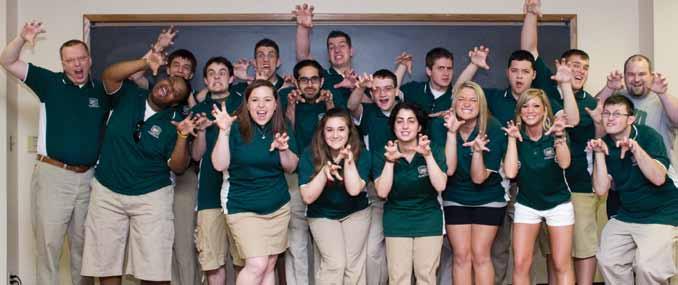
BY ALEC BOJALAD
“W
hen I was hired, they asked me to write up a public philosophy of Forensics,” Dan West begins. “I told them, very gutsy of me I guess, ‘Look, I am an Empire-builder. If I am going to do this again, I am going to be one of the best in the country. And I want a school that wants that too. If you don’t want that, you don’t need to hire me, you need to hire someone else.’”
Dan West, coach of Ohio University’s Speech and Forensics Team, says all of this slowly, carefully and without the slightest hint of exaggeration. This is his Empire and he is its Emperor. The Central Classroom Building is the Fortress, crumbling walls, tarnished brass doorknobs and all. It is an unlikely home for an Empire but an Empire this is.
The OU Speech and Forensics Empire is busy at work in its Central Classroom Building stronghold. In Room 310, several members practice for “Reader’s Theater.” They sit at a table, reading from a script in front of them. The pace is quick, frenetic and the content is bizarre. Names of everyone from Jerry Springer to Fat Albert come up in a group performance that is compelling, powerful and at times, offensive. In Room 315 of the Fortress, more members type away at computers, composing speeches and refining ideas. And in Room 312, four members engage in the most famous and perhaps romantic of all Forensics events: the debate.
This is just a practice. In theory, the execution must be sloppy and incomplete, but one would never know it. Professional athletes might be sloppy and incomplete during practice but they are still compelling
to watch — as is this. The group teams up into pairs that spar each other with words and ideas over U.S. Foreign Policy, an issue they may not even care about. The pace is breakneck, intimidating even. It doesn’t help that the opposing team is allowed to slap the table vigorously.
“The U.S cannot act as a…”
SLAP! SLAP! SLAP!
Hugo Chavez has affected world trade in such a way that…”
SLAP! SLAP! SLAP!
“Since 9/11, U.S Foreign Policy has shifted…”
SLAP! SLAP! SLAP!
Slapping is allowed in the grand tradition of debating when one agrees or disagrees with one’s opponent. And when the opposing team isn’t slapping the table, they are writing so vigorously on notepads that the pads seem in danger of catching fire.
The clash of language and ideas in a debate is an awe-inspiring sight to witness and the uninitiated on campus would probably refer to the Empire as a “debate” team. But God help you if you utter this in their presence. This is Forensics. They prepare a speech or performance, spend all year crafting and perfecting it, and then perform for stoic, blunt and finicky judges. Think of a speech
class only far more insane, competitive and stressful.
Just like any other competitive pursuit, Forensics has its rules and regulations. Universities host tournaments for schools to compete in throughout the year. This all culminates in a number of state and national tournaments. Teams might be made of 20 members or just one member and competitors may enter as many categories as they wish, or as many as they have a shot at winning. Some categories include Humorous Interpretation, Impromptu Speaking, Poetry and yes, Debate. Competitors then give their speech, debate or perform for a panel of judges who determine its merit. It is a more subjective process than points on a scoreboard, but like other competitive pursuits, the most prepared and talented usually prevail. This is where the Empire’s Fortress comes in. OU Forensics spends the majority of their days writing, practicing and refining the tiniest minutiae so that they can give a speech or debate a subject in their sleep.
Outside Room 315 is a rather prominent chart of the team members’ accomplishments and the goals they have yet to achieve, with the words “BUILDING AN EMPIRE” written below. The meeting room itself seems to be home to every trophy ever forged: trophies on the paper cutter, trophies behind printers, trophies resting on a furnace, all tokens of the Empire’s previous conquests. And most tellingly,
there are three charts of National Collegiate Speech Tournament finishes from 2006, 2007 and 2008. OU has finished eleventh for the past two years. Whoever made the poster has drawn a sharp line separating 11 from the top ten. The message is clear: eleventh is good, just not good enough.
Prior to West’s arrival in 2005, The Speech and Forensics team was in fairly poor shape. The budget was inadequate, the competition was gaining and it was increasingly difficult to secure quality coaches because the position was tenured. Coaches had to work twice as hard to not only look after a competitive program but also to put in the work to earn tenure. The situation could be likened to Coach Frank Solich having to teach COMS 103 and several advanced public speaking classes, in addition to coaching a Division I football team.
my family to lose … I don’t want to do things to be second-best,” West said, resolutely. Indeed a healthy respect of language, closeness of family and the push for excellence seem to be what has brought most of West’s recruits behind the walls of his Empire.
Novices don’t exist in the Empire. The system, the commitment and the expectations quickly beat the inexperience out of them.
Dan Glaser and Dani Bernat are juniors, but they seem much older. They are West’s first-ever recruits and two of the most successful individuals the Ohio Forensics program has ever seen. They are the longest tenured members on the team at three years service (similar to NCAA rules, Forensics teamers have four years of eligibility) but those three years seem much longer. Right now they sit facing each other, legs extended in a room of their Empire’s Fortress.
from a brutal fever that day, yet showed up to practice anyway.
“Whenever you’re not in class, you’re thinking about speech,” Annie said, “and at times, it is very, very stressful. It is a really big sacrifice … [but] we want to make those sacrifices.”
Tuesday nights are the only nights that team members are required to attend practice, but most members show up every day of the week, regardless. Those who don’t show up every day don’t last very long.
Members spread across the third floor preparing for the George Mason tournament. George Mason is the perfect litmus test for the national tournament in April. It is an unfamiliar location, with very difficult competition and judges unaccustomed to hearing the Empire’s speeches.
Fortunately, the university received a sizable donation to endow the position. All that was left was to find the right person to run the show.
Enter West and his empiric aspirations. This is when he boldly tells the administration that he is an Empire-builder. This is when he tells them that they need him and what he has to offer. After all, what could be better for a university with a “party school” image than an entire team of loquacious nerds that bring home trophy after trophy? It is no wonder West convinces the administration to listen to his message; West has been communicating his whole life.
Now he sits in his deliriously messy office. For someone who has dedicated his entire life to the art of speaking, persuading, debating and performing, West comes across as honest and casual. His speech has a steady, seemingly rehearsed flow. The only interruptions occur when an assistant coach or Forensic teamer walks in to bounce an idea off of him. What drives a man to dedicate his whole life to one practice, one art?
“I started [Forensics] when I was 13,” West said. “My brother did Speech in high school. What affected me the most, growing up in a Scandinavian household, was that he was articulate and when he spoke, people loved to listen to him; I admired that power.”
And then the Emperor in him kicks in.
“I don’t give up this much time away from
Dan seems just as introspective and confident as his coach. His answers come to him just as easy, and he communicates them with control.
“I started freshman year of high school. I might not have known it back then; why I started doing speech,” Dan said. “But now I know why. I like speech because everyone needs something … that they enjoy pursuing with excellence,
“I might have joined initially because my brother Chris was on the team, I stuck with it for...”
“My own reason. You find your own reason.” Dani finished his sentence.
Dan stoically nodded in agreement.
Just like their third-year teammates, Annie Farinella and Jeremy Frazer seem a little bit older than they are. Both freshmen have only been on the team for two quarters, but they are entirely indistinguishable from veterans like Dan and Dani. “Novice” is the technical term for their experience level. But novices don’t exist in the Empire. The system, the commitment and the expectations quickly beat the inexperience out of them.
“We want to finish top ten at the [National Forensic Association competition]. That’s our goal,” Jeremy said while sitting in front of a computer, taking a break from working toward Global Forensic domination. “At the end of the day, if I don’t break a single thing [advance to the next round] and we still finish in the top ten, I can say I had a great freshman year.”
Annie nodded in agreement, and then seemed to fade out a bit. She was suffering
The drive down to Virginia is boring, bleary and long. Second-year member Mike Catlos cannot keep his ears from popping in the elevation. The other teams are curious about this new competitor from Ohio. They aren’t hostile, but curious and wary of this potential threat to their Eastern Forensics scene. After two days of debating, speaking, performing and pleading the competition is over and the results are in. Tournament Grand Champion: Ohio University.
Dan, a tired, seemingly beaten down champion, is asked if a top ten finish at Nationals is still in play for this year.
“Top ten is definitely possible,” he said, before betraying a flicker of a smile, “Top ten is gonna happen.”
The Ohio University Forensics team competed in the National Forensics Association National Tournament from April 16-20 in Springfield, Mo. The team placed seventh overall. Dan Glaser earned National Champion in Rhetorical Criticism.

BY EUDORA PETERSON
One man’s trashed, half-eaten loaf of bread is another man’s choice eat. kip, a local dumpster diver, has unearthed everything from avocadoes to cases of wine, and each item has a past—from a grocery store, to a college student’s kitchen, to a local trash receptacle. And now, kip and freegans worldwide are ready to salvage what consumeristAmerica has written off as garbage.

“I don’t know why [people] throw out half the things they do,” Kip said. Kip is one of many who has lost patience with the materialism that fuels our global economy and become part of a grassroots worldwide movement called “freeganism.” Freegans, in the most radical form, are dedicated to boycotting products sold in our economic system. A portmanteau of “free” and “vegan,” the term’s etymology is derived from the idea that people can live alternatively while promoting freedom and social consciousness.
Kip, 23, grew up in West Virginia and moved to Athens five years ago. Currently homeless, Kip is not a student at Ohio University. He lives with friends or squats in abandoned homes, and more or less thrives as a freegan.
Waiting outside Alden Library, Kip casually rearranges his corduroy kilt and tucks a stray braid behind his ear. Clearly out of his element, he seems oblivious to the attention he attracts. “I don’t know if I’d be called a ‘freegan,’” he said honestly, “because I’m not necessarily a vegan. But most of the stuff I eat does come from dumpster diving.”
Dumpster diving, or “urban foraging,” is
the most common practice among freegans — and it’s often lucrative, sometimes resulting in carloads of food.
Kip and other divers make frequent, unplanned dumpster runs. Chance meetings usually occur, and people bond while foraging for food. Dumpster diving attracts unique individuals of all ages, and Kip recalls meeting parents with their children at local dumpster spots.
“Some families do it too,” Kip said. “[And] I’ve pretty much been to every type of dumpster you can find. Restaurants, grocery stores, gas stations. I sometimes go behind thrift stores because they throw out clothes. That’s where I got the kilt I’m wearing today.”
With the exception of a baseball cap that reads “party animal,” Kip found almost everything he’s wearing in a dumpster.
But no matter how ideal the dumpster may be, uncovering real gems requires sifting beneath the topmost layer. “If it’s been recently emptied, like only a foot deep, you have to get inside,” he said.
Knowing the law also plays an important role. While the act of dumpster diving isn’t illegal, shopkeepers worry people will sue if they are hurt in the process of climbing
into a dumpster.
“There are compacters that have secret doors you can open up and crawl inside. [B]ut those are sketchy because you never know when they’re going to turn it on, and if you’re inside...” Kip said.
Molly Shea, an OU junior and member of Students for a Democratic Society, take the principles of freeganism to heart. Both Molly and the members of SDS organize the local Free Store, where people are encouraged to swap unwanted valuables. Held every first and third Friday of the month at West Portico of Templeton-Blackburn Alumni Memorial Auditorium, the Free Store is built upon the basic freegan belief of mutual aid.
“It’s about people helping people. Hopefully [others] will realize the importance of giving back,” Molly said. While we all cannot commit to Kip’s way of life, Molly sets a refreshing example of existence in between the two extremes. She left me with telling advice: “Be freegan when you can be.”
BY SHAMUS EATON
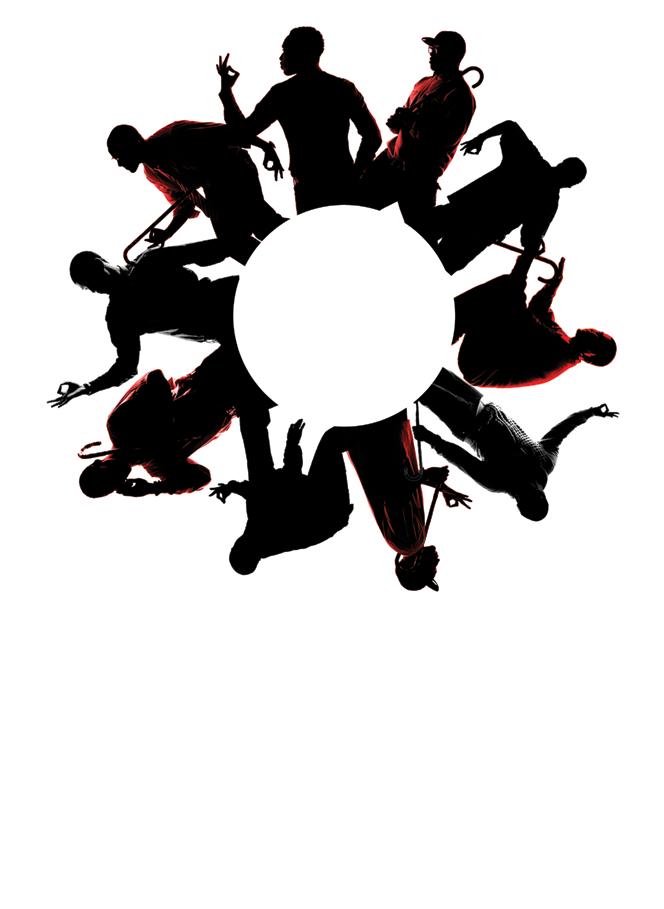
n a cold April night in Athens, a group of young black males files into the photo studio, each one in different red and white attire, or “crimson and cream,” as they will politely correct you.
As each member holds poses for solo shots, the rest of the group can’t resist teasing whoever is in front of the camera. As they await their turn in the spotlight, some casually twirl their canes, which match their outfits.
The canes are a signature item in their step shows, like the one being held at Templeton-Blackburn Alumni Memorial Auditorium on May 29. Anyone waiting for a cane to hit the floor on this night shouldn’t hold his or her breath. The canes are like an extension of their bodies naturally dangling between their fingers, like a cigarette resting in the hand of a chain smoker. When they step, the group moves as one. It’s the kind of dexterity and precision that only comes from hours of work, and the type of ritual that is rooted in deep and immense pride. These are the members of
the Kappa Alpha Psi fraternity, and their cohesiveness is undeniable. Their behavior is comparable only to that of brothers, and that’s exactly what they consider themselves to be.
The Kappas, or Nupes as they’re nicknamed, are one of six historically active African American fraternities and sororities at Ohio University, and one of nine governed by the National Pan-Hellenic Council. And although the words “fraternity” and “sorority” conjure keg-stand-type images for most undergrads on campus, others find the Greek social scene dominated by a world of stepping and strolling, colors and calls.
Some see these Black Greek letter organizations as prestigious institutions based in the strongest of African American traditions. Others see the groups as glorified social clubs, a far cry from what their founders intended. The average OU student though doesn’t see these groups at all, and misses out on a world of Greeks with a vibrant culture, controversies and challenges all very much their own.
Perceptions and opinions aside, Black Greek life is undeniably a huge part of OU’s black student community. Although numbers might be fewer than those at an historically black college or university, the percentage of black students involved in Greek life at OU is high, which some attribute to the student body make-up.
have one notable chapter alumnus back in Athens: President Roderick McDavis.
Nick Jones, a junior in the Omega Psi Phi Fraternity Incorporated, credited the influence of alumni like these and the rich history as his reasons for joining. “I wanted to be a part of an organization I knew I could make a contribution to that would be around for years to come,” Nick said. “A lot of organizations come and go … [but] no small group can bring down the tradition of a black fraternity.”
Any conversation with a current member about Black Greek letter organizations includes mention of prominent members and the organization’s extensive history. It won’t take long to learn that Martin Luther King was an Alpha and Michael Jordan was an Omega. If there’s something besides race that sets these groups apart from other Greeks on campus — though being black is not a requirement for pledging — it is an emphasis on history.

“When we stroll that shows our unity. We’re in a line [of] brothers to represent what we’re about.”
Starla Ford, a junior member of the Alpha Kappa Alpha Sorority, does not deny how integral Greek life is for black students’ social life. “It’s a highlight,” Starla said. “When you come to OU, there is limited access to [social events] for the black community.”
Marco Maldonado, member of kappa Alpha Psi
A look at black faculty members affirms the pervasiveness of Greek influence in Athens. Vice President of Student Affairs Kent Smith was an Alpha. And it can’t hurt for an Omega Psi Phi chapter on campus to
Perhaps this is why so many feel adamantly that this history is not being preserved through the actions of today’s organizations. Akil Houston, a visiting professor in the department of African American studies, said that what he sees today is a far cry from what once was. “They have essentially become social clubs,” he said. “They still do service but that isn’t the focus like it once was.”
Starla, who cites the legacy of the organizations’ prominent female founders as her reason for joining AKA, said that these types of criticisms aren’t always valid.
“They have to look at how the college landscape has changed. As more African Americans are coming to school it has taken on a social aspect.” She said she admires the fact that some of the organizations were born out of necessity when black students were not allowed to join traditional fraterni-
ties and sororities. She also said she believes that in the same way these original founders used the system as a support group at OU, the Greek life system helps black students identify with their new home. “While academics is always most important, you have to like the school you’re going to,” she said. “NPHC is there to create outlets and make the college experience feel more like home, more comfortable.”
To help accomplish this, on top of programming and community outreach, the organizations take turns putting on social events that include variety shows, step shows and icebreakers. An icebreaker is far from the stuffy, forced mingling the name implies. It is the equivalent of a traditional Greek social, except all of the organizations are invited as well as non-Greeks — so the only true minority at an icebreaker are those not dancing. Fraternities and sororities weave through the crowd performing strolls unique to their organization. Imagine long lines of high-energy synchronized moves that make the choreography of today’s brightest pop stars fall nothing short of mundane.
Marco Maldonado, a Kappa who joined in the fall, said that all the stepping and strolling business was not what attracted him to his newfound family. He said he was drawn in after attending a program put on by the Kappas about minorities in college when he was a freshman. Marco stressed that his time is not all spent making up dances, but he admits that it does have a significant place in the group. “When we stroll that shows our unity,” Marco said. “We’re in a line [of] brothers to represent what we’re about.”
When Marco made the decision to become a Kappa, he did his research. Unlike other organizations, Black Greek letter institutions make members choose wisely. Pledges have one shot and then they’re done — one of many formalities that separate them from the rest of Greek life on campus. Their letters always appear in their organization’s colors. Pledge classes are smaller, sometimes including only a single pledge, and their required knowledge of the Divine Nine (the nine historically Black Greek letter organizations governed under the NPHC) is extensive.
This extreme pride has often gotten chapters across the nation into trouble when it led to tension and even violence. Just last fall at Ohio State, all Black Greek social events were suspended for the following quarter because of altercations,

one of which involved a firearm, according to OSU’s student newspaper The Lantern. Baker University Center has added security at icebreakers because of previous altercations that have occurred during or after the events according to Angela Davis, Associate Director of Operations for Baker Center.
Marco claimed that Black Greek rivalries aren’t an issue at OU though. “Altercations may occur between anybody, but if two who are coincidentally Greek get into an altercation, then it would probably be seen as a Greek vs. Greek thing,” he said. “It’s a waste of time. We have to stay unified because there is such a low number of [minorities].”
With every issue facing Black Greek life, there seems to be an added challenge when operating at a whitewashed campus like OU.
Starla said incidents that draw attention
like the one at Baker Center are clearly a matter of logistics. “We have to do all our parties as entertainment on campus because we don’t have off campus space,” she said. “Off campus things happen, but they’re not going to get reported. Here we are under a spotlight.”
Nick said being at OU forces the organizations to function in a lot of ways that other Black Greeks don’t have to. “It’s different because we, as members, have to cross racial boundaries,” he said. “It’s impossible for us to accomplish anything trying to appeal just to the black community [at OU]. If we were at a historically black college, we wouldn’t have to deal with it, everything would be black, black, black.” The added challenges, Nick said, make the groups that much tighter.
“That’s the whole purpose of the fra-
ternity,” Nick said. “That bond that you build is so strong ... you feel like you can accomplish anything together. In school and society.”
This bond will be on display as the Kappas take the stage at the end of the month to compete against other fraternities and sororities in their biggest step show of the year. Greeks and non-Greeks will make up a raucous crowd, but the atmosphere is more celebration than competition. The girls will be just as loud as the boys as they stomp, and Mem Aud will be overflowing with colors and letters that hold century-old meaning. As they exit the stage in a line, no matter where those in attendance feel about Black Greek life, there is no doubt that they share a bond as strong as their originators. There is no doubt that they are brothers. b
two years
ago, an
Ohio University graduate student killed his father, a beloved history professor, by stabbing him more than 40 times. At the time, few people knew the killer had a history of severe mental illness.
Early one September evening two years ago, Ohio University graduate student Jonathan Bebb, then 32, stabbed his father to death. Afterward, he jogged a mile back to his apartment on Richland Avenue, cleaned himself up and walked to campus.
Jonathan had cut his father 40-some times with a small lock-blade knife, including stabs to the face, neck, chest and genitals. He had walked to his father’s house on Mulligan Road that day to reconcile. He wanted his father, Phillip Bebb, 66, a semiretired associate professor of history with a focus on the Italian Renaissance, to admit to the family that he had been sexually abusing and psychologically tormenting Jonathan for decades.
Psychologists say Jonathan, who at one time or another was considered to have had a spectrum of mental illnesses — bipolar disorder, paranoid schizophrenia, depression — has delusions, confabulations. He believed his father was a perpetual threat to his health and safety. He felt he couldn’t get on with his life and accomplish his goals unless that threat was removed. His delusions were real to him, even if somebody told him they were not real. His perception of reality was his perception of reality, and Phillip had mentioned to neighbors that he feared
Jonathan might try to hurt him.
When Susan West, Jonathan’s stepmother, returned home, she went inside and discovered red on the stairs and the kitchen floor, blood on the walls like a Jackson Pollock. She found her husband’s body on the floor in the doorway of the TV room, shirtless, carved and bloody. She immediately called 911.
Reserve Unit Commander David Malawista was moderating a community policing dialogue at the rec center on State Street when he received a call about a homicide. “They wanted me to go and deal with the wife, who had walked in and found her husband butchered,” he said. “It’s the only way to describe it.”
When Malawista arrived at the house, West had already been transported to O’Bleness Hospital. Malawista took a brief look around inside, stepping over bloodstains, a path of red footprints through three different rooms. There was blood in the bathroom and the door was kicked in, toiletries scattered on the floor. The house, it smelled like Listerine.
Malawista had seen a number of homicides, various mechanisms of death. This was a nasty one. This was personal. A knife is much more personal than any other weapon — it takes a lot of time and energy
and close contact to deliver that kind of damage to a human body.
Initially, police assumed Phillip had committed suicide because there were no signs of forced entry into the house. His son, Jonathan, was also brought up as a possible suspect due to mental health issues he was noted to have.
Jonathan was charged with the murder early the next morning. Later in the day, he was cleaning out his car at his mother and stepfather’s house when police arrived. Questioning moved into the living room, where Jonathan told investigators about his dysfunctional relationship with Phillip. Investigators noted that during the routine interview, Jonathan showed “little emotion or reaction about his father’s death.” They noticed a cut on Jonathan’s thumb, which he said was from a “kitchen accident.” Investigators asked Jonathan if he had hurt his father, and Jonathan said, “I need to think about it for a while… That’s complicated.” He was taken into the police department on College Street for further questioning.
On November 18, 2007, Jonathan was indicted on one count of aggravated murder, to which he pled not guilty. By March 2008, following the result of a
mental evaluation, his lawyers, R.J. Shostak and Kort Gatterdam, changed the plea to not guilty by reason of insanity (NGRI).
With NGRI, the rules of engagement in a courtroom change. Normally, a defendant is innocent until proven guilty and the burden of proof is on the prosecution. With an affirmative defense, like NGRI, the process reverses: the defense says, “My client did commit this crime, but he is not responsible”; and thus the burden of proof — that the defendant did not know the wrongfulness of his actions — falls on the defense.
Before the trial, concurring testimonies from independent psychologists hired separately by both the defense and prosecution said Jonathan was suffering from severe mental illness at the time of the offense. Malawista was called in to translate the psychological evaluations for both sides. He, too, concurred. Everyone — even prosecuting attorney C. David Warren — was in agreement that Jonathan was probably not guilty by reason of insanity. Judge Michael Ward, however, wanted to go ahead with a jury trial, perhaps because, given the high profile of the crime in such a small community, he believed it was important for society to see the truth unfold. NGRI is a community statement that says: This is an ill person who needs to be treated, as opposed to a bad person who needs to be punished.
by his father, whom Wilhelmina described to psychologists as a “profound narcissist” and a “severe alcoholic” during their marriage, and the split only furthered Jonathan’s suspicions of him.
Jonathan studied engineering as an undergraduate at OU. During winter break of his sophomore year, in 1994, he experienced his first psychotic break. Newlyweds Wilhelmina and David Lusty took Jonathan and Aaron to Hilton Head for Thanksgiving. Jonathan was acting strange. He seemed out of it; he refused to eat meals with the family and they had trouble getting him out of the condo. Wilhelmina was frightened by how much Jonathan was acting like her brother, who was diagnosed with schizophrenia in college and was in and out of hospitals and halfway houses until his death. Mental illness runs in her family, cropping up in the bloodline at least back to her grandfather, who would cover windows in his house with aluminum foil to keep out “the bad rays.”
“In some ways,” Malawista said, “all we’re doing is arguing about what kind of door he spends the rest of his life behind.”
“In some ways,” Malawista said, “all we’re doing is arguing about what kind of door he spends the rest of his life behind.”
On October 1, 2008, a little more than a year after Phillip Bebb was murdered, the jury was informed that both sides were in agreement and Jonathan was found not guilty by reason of insanity.
Jonathan was born and raised in Athens. Childhood friends remember him as shy and introverted, and incredibly intelligent. Jonathan was a self-taught reader, who, by age four, was already reading Nancy Drew and the Hardy Boys. His parents, Phillip and Wilhelmina (Lusty), went through a bitter divorce when he was 14. The family split: Jonathan lived with his mother and his brother, Aaron, three years his junior, lived with Phillip. Jonathan already felt rejected
Phillip scheduled an appointment for Jonathan with Dr. E.S. Guy of the Worthington Center Outpatient Services in Parkersburg, W.Va. On February 10, 1995, Phillip told Dr. Guy that for the past two months Jonathan’s behavior had been abnormal, characterized by poor judgment, excessive activity, fighting and spending. Jonathan had once threatened suicide in an angry rage, Phillip said. Dr. Guy diagnosed Jonathan with Bipolar Disorder, Acute Mania, and recommended Lithium treatment.
By August 1996, Jonathan’s symptoms were worsening. His delusions were more constant, stable. The Lithium treatment was deemed sub-therapeutic and Jonathan was refusing medication for depression. His diagnosis was then amended to “something in the schizophrenic spectrum.”
Over the next ten years, Jonathan was treated on and off for mental illness, and most of the doctors who treated him thought he was psychotic. He spent five years interning and working for the Southface Energy Institute in Atlanta, GA. When he returned to Athens in 2003 and moved in with Wilhelmina and David, Jonathan was obsessed with what he claimed was ongoing sexual and psychological abuse against him by his father. There was a videotape Phillip made, which Jonathan watched obsessively. In the video, Jonathan and Aaron are playing with a garden hose. Jonathan saw subtle sexual suggestion in the video and thought Phillip was trying to convey a secret message to him.
“I knew it was mental illness,” Wilhelmina told one psychologist.
Jonathan was growing more withdrawn and his delusions persisted. He installed locks on the door to his room in Wilhelmina’s house and accused a girl he was seeing of using neurological tricks to make him impotent. Though he locked himself in every night, Jonathan complained to Wilhelmina that he was being raped. Wilhelmina begged him to
get help, but there wasn’t much she could do to make him.
Still, the positive and negative symptoms of his mental illness weren’t inhibiting his ability to function. He enrolled in the master’s program in electrical engineering at OU, made excellent grades and was involved in the OU chapter of Engineers Without Borders (EWB).
In 2006, Jonathan told Wilhelmina that when he was seven years old, Phillip anally raped him in a guest bedroom of their house. He believed that Phillip continued to “use date rape drugs and other hypnotic means to anally penetrate him at will.”
He told Wilhelmina that he’d been trying to relay messages to her in a coded language regarding Phillip’s alleged abuse. That year, while in Ghana, Africa, with EWB, Jonathan was convinced Phillip was controlling his thoughts from across the Atlantic.
longer shower because the water in the apartment is poisoned.”
Unbeknown to Wilhelmina, Jonathan had stopped treatment with OU counseling at the suggestion that he might be schizophrenic. On September 5, just 19 days before Phillip Bebb was killed, Jonathan’s therapist at Tri-County Mental Health and Counseling Services, Inc., left him a phone message, asking if he wanted to continue treatment.
Mental illness runs in Jonathan’s mother’s family, cropping up in the bloodline at least back to her grandfather, who covered the windows in his house with aluminum foil to keep out “the bad rays.”
Jonathan visited OU Health Services and O’Bleness Hospital on several occasions complaining about a sexual assault and anal discomfort. Extensive emergency room tests showed no signs of rape. Other times, he presented concerns about the water he drank, said it was causing him drowsiness and fatigue; and tenderness behind his ear, which he believed was from a foreign object in his skull. He asked doctors at Hudson Health Center to test his semen for saltpeter, a potassium nitrate component of gunpowder that causes impotency in men.
For a long time Wilhelmina feared she would find Jonathan dead from suicide. She had no way of knowing whether he was actively seeking treatment because he refused to share personal information with her. His apartment, which Wilhelmina owned, was a mess. He had covered the air vents with duct-tape because he was afraid the air was poisoned. He tried to “cure himself” by inducing diarrhea and drinking gallons of water in just a few hours. In August of 2007, Jonathan sent an e-mail to his brother that said, “I no
Officer Malawista, 63, looks a lot like the actor J.K. Simmons. He joined the Athens Police Department in 1974 and split time between its behavioral services unit and the Athens Mental Hospital, where he was a clinical psychologist (and later, director of psychology).
Today, Malawista is responsible for teaching law enforcement officers how to deal with the mentally ill, which, he said, is a growing problem.
“As the mental health system downsizes, law enforcement become the purveyors of emergency services more and more,” he said.
Malawista first met Jonathan Bebb about eight months prior to the homicide. Jonathan came to a community policing dialogue to discuss the recurrence of people putting drugs in his drinks uptown and taking advantage of him. Jonathan presented a dozen such incidences, but it was the way he presented them — controlled, cautious, reluctant to talk — a real victim usually doesn’t behave that way. From experience, Malawista knew he was dealing with someone who was paranoid, delusional. After the meeting, another officer came up to Malawista and said, “That guy a paranoid schizophrenic?”
“That’d be my diagnosis,” Malawista said. He had heard stories from people who had encountered Jonathan and were concerned about him. Clearly Jonathan was suffering, but there was little Malawista could do. Jonathan wasn’t seeking help for his mental illness; he wanted protection against imagined criminal activity being perpetrated against him.
Instead of receiving treatment, Jonathan was left to his own devices; to crumble as
his delusions apparently spiderwebbed. The APD did not see Jonathan again until the night of the homicide.
The Bebb case illustrates a potentially self-perpetuating flaw of the U.S. mental health system — even in Athens, southeastern Ohio’s most equipped and compassionate county for the mentally ill. To involuntarily commit someone suffering from mental illness, he must meet at least one of four very narrow statutory requirements. A severe disorder of thought, mood, perception, orientation or memory must so impair him that 1) he’s a threat to himself; 2) he’s a threat to society; 3) he presents an imminent risk to his own substantial rights or the substantial rights of others; or 4) he’s unable to meet the demands of everyday life, like bathing and eating.
Now Jonathan, who will turn 34 on May 23, spends his days in the Timothy B. Moritz Forensics Unit — a bright, relatively new hospital inside a very secure perimeter, with guard towers, locking levels and barbed wire fencing — in Columbus. After six months his case will be up for mandatory review, in which Judge Michael Ward will evaluate evidence regarding Jonathan’s progress in treatment. If Judge Ward believes Jonathan has made significant progress, he will be eligible for a transfer to a lower-security mental treatment facility — most likely the Athens Mental Health Center. Following the six-month review, the case must be reviewed at least every two years, though the defendant’s lawyer can ask for a hearing sooner if he believes something has changed. R.J. Shostak has turned the case over to Kort Gatterdam, who said Jonathan’s hearing had already been scheduled for early May as of press time.
Malawista said he had spoken to a “lead forensics person” at Moritz who said that nobody is going to recommend to Judge Ward that Jonathan leave treatment there.
b
A letter from Jonathan, dated 4/19/09, said he could not comment on his situation. Aaron Bebb did not respond to an interview request. Wilhelmina Lusty and both psychologists who evaluated Jonathan declined to comment.
--Greg Gallant contributed to the reporting of this story.

While jobs disappear and budgets tighten, students sell plasma to earn extra cash
B Y S TEPHANIE S TAR k
After piteously losing both of my jobs in one day, I was turned off by the idea of putting in the time applying to conventional occupations around town. As they say, looking for work is a full time job in itself. As a typical “poor college kid,” with no aspiration to work minimum wage, I was persuaded into selling my bodily fluids at BioLife.
I had heard about “donating” plasma at the beginning of my freshman year here at Ohio University, but was constantly dissuaded by negative feedback from my family, which includes a few nurses and other health care professionals. My donor friends told me that I could make over $200 a month for only two hours a week and that it was the easiest thing they had ever done for money. Donors can also donate up to two times a week — that’s eight times a month.
It seemed way too good to be true, so I assumed that there had to be something shady about it. But college is for experimenting, right? So, against my parents’ wishes and my own intuition, I began saving lives by donating my plasma.
The BioLife plasma donating center was nothing like I had imagined. It wasn’t a trashy dump and the employees weren’t some back alley medics. Dozens of certified phlebotomists (plasma-drawing nurses) are there to serve your every need. BioLife is a professional institution. The Athens center is just one of dozens around the country, many of which are commonly located near college campuses in order to provide easy money for healthy, but poor college kids.
Despite a few technical difficulties, my experience donating plasma has been successful, but not entirely stress
Q. Does it hurt?
A. No worse than donating blood.
Q. How much money can be made?
A. With two donations a week, $250 a month. The donor receives $20 the first time in one week, $35 the second time in one week, plus a $10 bonus every fifth time in one month, and a $20 bonus every seventh time in one month.
Q. How long does it take?
A. A 10-minute drive and an hour long drain. First timers have to get a physical, so expect to spend two hours on the first go around.
Q. How does it affect my health?
A. Plasma strengthens your immune system, so for a short time you’ll be vulnerable to even the weakest of germs.
Q. Is it safe?
A. The needles are disposed of after every use, and a survey must be taken
free. Being a mere 5’3, 120 something pounds, I am not the conventional plasma giver. Most donors I met were hulking men, likely weighing in at around 200 lbs. or more. Bigger males are better equipped with large, juicy veins to stick with the needle. The first time donating is experimental for both the phlebotomist and the donor. The phlebotomist adjusts the system to the donor’s body mass and weight, which is an exercise in pain. This happens more often with smaller people because of the likelihood of them having smaller, less eager veins. So, yes, sometimes it can hurt. What is most important, though — besides the money, of course — is that donating plasma saves lives. While speaking to a nurse at BioLife, I got the impression that even though some donors just want to get paid, what they sometimes forget are the emotional and physical benefits for the patients who receive the plasma. Plasma is added to products such as intravenous immune globulin, Albumin, and Fraction IV paste, which assist in strengthening the immune system. The medicines made with these plasma-based products are often given to sick children and people with Primary Immunodeficiency Disease, Common Variable Immune Deficiency or Hemophilia. So, while the big bucks are reward enough for us poor, struggling college folk, a quick donation can save someone’s life. Nothing like guilt-free, work-free moneymaking. b
on each visit to correctly assess that the donor is healthy enough to donate that day. If the donor does not have enough iron, protein, or has less than perfect health, he or she will be rejected for the day.
Q. Should you donate plasma?
A. If you’re healthy, sure. Plasma can drastically improve or save someone’s life. Because plasma can’t be recreated in a laboratory setting, donating is the only way to create a stockpile. Thus the copious amounts of money for donations.

If she wore a skirt, he called her a slut. Every time he punched the walls, she would cringe, envisioning herself as the next tangible target of his frustration. He wouldn’t let her talk to male friends but felt free to cheat on her. As he loved to remind her: he was the venerated athlete, and she was nothing without him. When she finally got up enough courage to leave him, he showered her with affection, talked of marriage and children and begged for forgiveness. When she was offered a summer internship out of state, he threatened suicide to dissuade her. She stopped eating. She lost her nerve. Today, she believes her decision to take that internship is what saved her life.
Years later, the pain is still etched in
Megan’s face. While she is open to sharing her experience, the stories of emotional abuse from her undergraduate days conjure feelings of regret. Despite this, second year graduate student Megan, who asked that her last name be withheld, shares her struggle in hopes that someone who has yet to realize the unhealthy patterns in his or her relationship does, and seeks help.
At Ohio University, 55 percent of women indicated they had been a victim of moderate emotional abuse in a college dating situation, and 16 percent reported severe abuse in a survey conducted by the Laboratory for the Study and Prevention of Sexual Assault. Christine Gidycz of the Department of Psychology defines moderate psychological abuse as “being
insulted or sworn at, having partners stomp out of the room or house, and making spiteful comments.” More severe psychological abuse includes threats of violence or public displays of aggression, such as destroying property. Moderate physical abuse, according to Gidycz, includes pushing or throwing things at your partner, while severe physical abuse ranges from, “being kicked, bit or hit with a fist ” to “being threatened with a knife or gun or actually having a partner use a knife or gun against the victim.”
In a separate study, 48 percent of males reported that they had engaged in severe verbal aggression. The surveys used behaviorally specific criteria to determine victimization instead of using the term
Does your partner:
[ ] Look or act in ways that scare you?
[ ] Criticize, humiliate or manipulate you?
[ ] Act extremely jealous or possessive?
[ ] Do things that you make excuses for?
[ ] Control what you do, how you dress, who you see or where you go?
[ ] Destroy your property?
[ ] React unpredictably and explosively?
[ ] Take your money, make you ask for money or refuse to give you money?
[ ] Threaten to hurt you, your family or him/herself if you break up?
[ ] Force/pressure you to have sex?
[ ] Blame his/her behavior on alcohol or drugs?
[ ] Blame others for his/her problems?
[ ] Say “I love you” too quickly in the relationship and use this to gauge your interest?
“abuse,” because often individuals’ actions can meet the legal definition of abuse, but they may not identify their experiences as such. Though males are known to underreport victimization, statistics still show that abuse victims are predominately female.
Many assume that if their partner does not physically assault them they are not being abused. Physical abuse often leaves bruises, cuts or lacerations — tangible scars. For this reason, society often sees emotional abuse as less violent or less painful. Victims rationalize their partners’ behavior by saying “at least I wasn’t hit.” This is one of the reasons emotionally abusive relationships can be more chronic than those that are sexually or physically abusive, according to Gydicz. With no corporeal indicators, the difficulty in proving psychological abuse keeps individuals from reaching out for help. The newfound freedom students find at college can lead to abusive relationships of all kinds. Many relationships that are physically or sexually abusive are also emotionally abusive, and many emotionally abusive relationships escalate into physical violence. Megan’s ex-boyfriend ended up hitting his next girlfriend. Later he proposed to her.
came over hours late, clearly intoxicated. As he lay slumped over on the couch, Megan tried to push him up. That’s when he swung and just missed her face. The day after, he denied it. Often times, he would throw things or punch walls to scare her. When confronted about cheating, he would make up elaborate lies about “this girl who keeps stalking me” who turned out to be his girlfriend on the side. After a year and a half, Megan finally mustered up the strength to leave, battling feelings of depression and worthlessness.
In addition to overcoming feelings of powerlessness and isolation, those trying to get away from abuse often find themselves pigeonholed by technology. Amanda Childress, the assistant director of the Department of Health Promotion, has found that stalking incidents have increased considerably due to social networking and text messaging.
It takes an average of seven times of actually leaving an abusive relationship before a victim will leave for good.
“Facebook, Myspace and other social networking sites make it very easy to find out personal information about other people such as who they’re dating now, what they’re doing,” she said. “It can be very difficult to get away from a person who is abusive when they have a wide variety of means to get to you.”
It’s important to realize that abusive relationships and the people experiencing them vary on a number of dimensions. Leaving is a process, and not something that can be forced upon someone.
Megan admits that when her friends stated their concerns or complained about her boyfriend, she would push them away. They often stopped criticizing her relationship because they wanted to maintain the friendship. Though she has since rekindled her connections, she admits she wished she would have listened sooner.
What specific behaviors have you seen? What specific changes have you seen in your friend? Focus more on your concern for how your friend is feeling instead of being directive and putting the label of abuse on a situation, or attacking the perpetrator’s character.
College is a time of identity building and often the first time students have been away from the care of their parents. Megan believes being alone in a foreign environment contributed to her feelings of isolation.
“You’re extremely vulnerable, being away from home ... not everyone comes to college with the strongest of backbones,” she said. “I didn’t date in high school at all. I focused on sports and my friends so when I came to college, I was very naive about relationships.”
Megan and her ex-boyfriend met playing a mutual sport during her undergraduate studies. After a few months, he had already said “I love you.” Megan admits feeling it rushed the relationship, but she had never been with someone before and liked the attention and affection. Soon after, he began controlling her social life — who she saw, what she wore. One night, they were supposed to have a movie night and he
Childress notes that, according to statistics, it takes an average of seven times of actually leaving an abusive relationship before a victim will leave for good. After reading a checklist on dating abuse and realizing she identified with every single one, Megan knew it was time to get out. Over time, she changed her phone number, blocked her ex-boyfriend and removed his friends from her social networking profiles. However, it was not until she graduated and moved out of state to attend OU that she really felt she had escaped.
“For over a year this ruined my life. If I can do something good with it, I want to,” she said. “I hope people read this story and realize they’re being abused. I hope they can say ‘Even though no one is hitting me, I am being verbally abused and I don’t know who I am anymore.’”
My Sister’s Place: 593-3402
OU Police Department: 593-1911
Athens Police Department: 592-3313
(Both OUPD and APD offer assistance with protection orders)
OU Counseling and Psychological Services: 593-1616
OU Women’s Center: 593-9625
Athens County Victims Assistance Program: 592-3212
BY ELIZABETH SHEFFIELD
Since its founding in 1953, Playboy has made its way into countless residences, and now boasts a world-wide circulation of roughly 3 million. t he Library of Congress even distributes the magazine in b raille, allowing some Playboy readers to appreciate spherical protrusions and award-winning articles simultaneously. And, although Alden Library doesn’t carry any of the b raille editions, it does occasionally house some of the magazine’s original content.

parents often use holiday newsletters as backhanded devices for publishing their kids’ success on everyone else’s fridge. This is embarrassing. This is even more embarrassing when Mom includes a blurb about you posing in Playboy, and then mails it to your former teachers. People judge.
Kayce Berke was upset when this happened, but was quick to forgive her mother, who was just as proud about the naked photos as she was about Kayce’s educational endeavors.
By the time Kayce appeared in the May 2006 issue under the pseudonym Kamelia Berke, she had already traveled abroad to Costa Rica, participated in the Global Leadership Center at Ohio University and established a strong agenda for the future. This agenda did not include Playboy.
“Playboy wasn’t something that was a lifelong goal,” Kayce said. “The naked body is only one facet of a person — that’s one hundredth of my person. I didn’t really see [posing] as a big deal.”
Posing for Playboy has, however, given her a more direct perspective on the social disputes associated with nude photographs. Though Kayce rejects categorizing herself as a “nudist” or a “feminist,” she views nudity as an art form, and doesn’t see anything wrong with it in respected contexts.
Kayce has since graduated from OU’s undergraduate program, but hasn’t left the classroom. Now, she can be found in Gordy Hall grading tests or correcting pronunciation as a Spanish teaching assistant. She also maintains her undergrad roots by bartending at the Crystal.
After her anticipated completion of her master’s in Spanish Literature this coming November, Kayce plans to live in Brazil for six months and learn Portuguese. After that, she foresees going back to the classroom for another master’s in Peace and Conflict Resolution. Kayce loves the discourse and constant questioning academia provides, and foresees a career as a professor.
With thoughtful social commentary and big plans for the future, it seems like Kayce’s life is perfectly balanced except for one thing — she only has one nipple pierced.
Beyond this minor imbalance, Kayce also maintains a pragmatic view of her past, including her posing experience. In fact, Playboy doesn’t even make her top 10 most profound moments. Those precious spots are reserved for more genuine influences, such as the professors and friends she has gained at OU.
Another OU Playboy Bunny www.backdropmag.com

7am - 10am
Mon - Wed Wed Late Night Thu - Sat Sun 7am - 3pm 11pm - 4am 24 Hours Close @ 5pm
BY RACHEL GODWARD
I swerve to avoid the Mack truck as it barrels past my left side, inches from sending me six feet under. My bicycle seems to breathe a sigh of relief as my racing heart slowly returns to normalcy. I search for concerned faces on the street, peering out of car windows, or something. Alas, no one saw a thing. Surrounded by pick-up trucks with super-sized rims and vans that could fit a small country inside, bicyclists become almost invisible on the busy brick streets of Athens. And unfortunately, our wheeled friends have nowhere else to turn.
Only a few streets on campus actually have bike lanes, and none of these is particularly busy. I live on East State — the scene of the Mack attack — and being the main route to the pseudo-civilization that Wal-Mart provides, cars whiz around pretty quickly. And yes, it really was a Mack truck; I wish I could say I was exaggerating. Perhaps it would have saved me that single gray hair I swear I sprouted that day.
Our campus, beautiful as it may be, was clearly not laid out with bicyclists in mind. The bumpy, narrow streets and shoulders packed tightly with cars make two-wheeled travel unsafe and unaccommodating. Even the perfectly smooth sidewalks are incessantly stamped with “No biking/skateboarding” signs. It’s like bikers are seen
as an infestation of rebels, associating with rebellious people and spreading their rebellious behavior all over town. “Stay away! Or we’ll send law enforcement after you!” Really, they will.
I appreciate all that the Athens Police Department does for us students — saving lives, catching criminals, busting parties … but is chasing down bicyclists really neces-
With as many bicyclists as there are on campus, we need to get a little love - love in the form of bike lanes.
sary? Of the several times I have biked on the sidewalk, for fear of getting run over on the street, an officer has puffed up his chest, flashed his badge, and yelled at me; each time screaming that same disgusted phrase: “Get off the sidewalk with that bike!”
Even meter maids get in on the action, and believe me; they do not like to be sassed. It doesn’t matter if you’re rolling along at the speed of a turtle, pedals untouched; I once did exactly this and was yelled at by an angry, quarter-collecting upholder of the law. On the phone at the time, I mentioned the situation to my friend, only to be immediately
answered with an offended reply. She yelled even louder to say, “I was not yelling at you!” Apparently she overheard my conversation — an astounding feat since I was nearly 20 feet away and whispering.
They respond to my biking as though I’ve decided to play dress up in their Sunday best and then roll around in a mud bath. Now that would be yell-worthy. But as one measly bicyclist — what harm am I really causing?
I like to think I’m a pretty easy-going girl; if you give me bike lanes I will gladly use them. But a short lane from Bentley to Baker and another from Buffalo Wild Wings to the Convocation Center simply aren’t enough. With as many bicyclists as there are on campus, we need to get a little love — love in the form of bike lanes. Some of us cannot afford cars, or got the short end of the stick when relatives passed on cars to everyone else but us. Biking is a common form of transportation and should be respected as such.
I say we start a petition. (“We” meaning bikers, friends of bikers, spouses of bikers, and acquaintances of bikers who really can’t stand bikers, but support them anyway, for some reason). Let’s rally the troops calmly and rationally, sans screaming, and hope to someday bike among peaceful pastures — void of bitter law enforcement and with bike lanes aplenty.

